What are your chances of acceptance?
Calculate for all schools, your chance of acceptance.

Your chancing factors
Extracurriculars.
How to Write the Penn State Supplemental Essays 2023-2024

Penn State has one, optional supplemental essay prompt for all applicants, which is essentially a personal statement. Applicants to Penn State’s Schreyer Honors College, or Accelerated Pre-Med program, will also have to respond to a fairly extensive list of supplemental prompts—2 essays and 8 short answers for the Honors College, and 4 essays for the BS/MD program.
Regardless of whether you are just applying to Penn State as a whole, or to one of these more specialized programs, you want your essays to shine. In this post, we’ll break down each prompt, so you’re prepared to write a strong, engaging response to each prompt.
Read these Penn State essay examples to inspire your writing.
Penn State Supplemental Essay Prompts
All applicants.
Prompt: Please tell us something about yourself, your experiences, or activities that you believe would reflect positively on your ability to succeed at Penn State. This is your opportunity to tell us something about yourself that is not already reflected in your application or academic records. (500 words, optional)
Schreyer Honors College Applicants
Prompt 1: Describe a problem you’ve solved or a problem you’d like to solve. It can be an intellectual challenge, a research query, an ethical dilemma – anything that is of personal importance, no matter the scale. Explain its significance to you and what steps you took or could take to identify a solution. (800 words)
Prompt 2: Isaac Asimov wrote: “Any book worth banning is a book worth reading.” Do you agree? Is such censorship ever justified? If not, explain why. If so, who or what should determine which books are read and which books are forbidden. (800 words)
Short Answers
Prompt 1: What do you hope to get at Penn State as a Schreyer Scholar to help you accomplish your future goals and aspirations? (200 words)
Prompt 2: If you were able to go anywhere in the world, outside of the country you currently reside, where would you go and why? (200 words)
Prompt 3: Tell us about your leadership experiences (community roles, family contributions, research, clubs, organizations, etc.) and why leadership is important to you. Describe the challenges and/or successes you’ve faced in these roles. (200 words)
Prompt 4: List awards or other recognitions you have received in or outside of school over the last 4 years. Which award or recognition means the most to you and why? (200 words)
Prompt 5: Tell us about a book or other media that has made you think about something in a new way. (200 words)
Prompt 6: Consider a time when you had to collaborate with individuals from diverse backgrounds or with different perspectives. How did this experience contribute to your personal growth and understanding of others? (200 words)
Prompt 7: Everyone belongs to many different communities and/or groups, including: shared geography, faith, ethnicity, income, cuisine, interest, race, or intellectual heritage. Choose one of the communities or groups to which you belong and describe how it has influenced your life over the last four years. (200 words)
Prompt 8: Please use this space to share information you would like us to consider that has not been discussed elsewhere in your Schreyer Honors College application. This could include obstacles you’ve overcome, something you’re proud of that is not discussed elsewhere, or anything else you choose. (200 words)
Accelerated Premedical-Medical Program (BS/MD) Applicants
Prompt 1: Describe one non-academic activity during your high school years that has been the most meaningful to you. (250 words)
Prompt 2: Write a personal statement indicating why you want to be a physician, why you want an accelerated program and why you’ve selected this Penn State/Kimmel program. (500 words)
Prompt 3: Describe what you think your strongest qualities are as well as weaknesses that you would like to improve upon. (250 words)
Prompt 4: Tell us about a time you were unsuccessful and how you grew from this experience. (500 words)
Please tell us something about yourself, your experiences, or activities that you believe would reflect positively on your ability to succeed at Penn State. This is your opportunity to tell us something about yourself that is not already reflected in your application or academic records. (500 words, optional)
While this essay is technically optional, we still strongly encourage all applicants to complete it. Writing an optional essay provides admissions officers with more information about you, helps your application stand out, and further expresses your interest in the college you are applying to.
One of your main objectives in all college essays should be to depict yourself as a strong addition to a specific college’s community. A good response will contain a reflection on your experiences to demonstrate a specific personal quality that you think will set you up for success at Penn State. To brainstorm, ask yourself: What do I need to succeed at Penn State? What are my strengths?
You’ll need to think of examples that demonstrate the traits that will set you up for college success. Though the prompt says that you can pick “something about yourself, your experiences, or activities,” your choice should be something that you can show through a story or anecdote.
Almost any poor topic can be strengthened if you make it more specific:
Don’t pick something too broad, like “I have formed many friendships in different settings.” However, you could write a detailed account of a specific friendship or friend group you formed after switching high schools, explaining how you developed the skills to not only survive, but thrive in a new social community. Then, you can discuss how, at any college, but especially a big school like Penn State, forming a social network is crucial for academics (study groups, peers to help with homework, collaborators for group projects, etc.) and for making the most of your college experience.
Avoid focusing on an experience that virtually all applicants will share. “I made it through high school” is not a strong response. However, you could write about an illness you faced that almost jeopardized your ability to succeed in school. Through detailed storytelling, you could show the reader that you developed time-management skills and perseverance, which, as you can guess, are absolutely crucial for college success.
Great responses to this prompt can be quite personal since more formal academic and extracurricular activities might already be covered in your application. For example, you could relate difficult family or friendship situations you’ve negotiated to your ability to navigate a diverse and complex college community.
Regardless of which aspect of your identity, experience, or activity you pick, be absolutely sure to avoid generalizing. Many students write a 500 word essay that never uses specific examples. While these essays might sound smooth, they are almost entirely composed of clichés and generalizations. Here’s an example so you can get a better idea of what we’re talking about.
A student could write something like:
“I have volunteered for over five years at my local food pantry. This experience has made me more appreciative of what I have, and more determined to give back. I know I’ll take these values with me to Penn State.”
Note that these sentences do not refer to a specific instance or give concrete examples. They give a general description of one activity and then make generic, high-level assertions about the results of that activity.
A strong essay will push beyond this level of resolution:
- Describe what you did at the food pantry.
- Show the perspective this has given you by giving an example of how you changed your daily activities or interactions with others as a result of this experience.
- Link these changes to success in college by discussing how you’ll dive into volunteer opportunities and community organizations. Use specific examples of clubs or organizations at Penn State, such as the Lion’s Pantry, which is dedicated to addressing student hunger.
A few words of caution: Some students will have too many things they want to squeeze into this essay. While you may feel like you’ve just left so many crucial details out of your application, you should resist the temptation to use this essay as a “catch-all” for everything “not already reflected in your application.” Note that the prompt asks you to share “something” not already included—not everything! This essay should be focused and cohesive, telling a story that proves you can succeed in college.
If you truly feel that important information has been left out of your application, try to incorporate it into your Activities Section, other essays, or, if all else fails, the Additional Information section of the Common App.
Schreyer Honors College Applicants, Essay Prompt 1
Describe a problem you’ve solved or a problem you’d like to solve. it can be an intellectual challenge, a research query, an ethical dilemma – anything that is of personal importance, no matter the scale. explain its significance to you and what steps you took or could take to identify a solution. (800 words).
Brainstorming Your Topic:
Given the length and nature of this prompt, taking the time to select a strong topic is especially important. You need to pick a topic that is nuanced enough to sustain 800 words, but also personal enough that you can answer each part of the prompt while also highlighting aspects of your personality that make you a strong fit for the Honors College.
Fortunately, the prompt’s criteria are pretty open-ended, and admissions officers go out of their way to say the scale of the issue doesn’t matter. So, to brainstorm, we recommend asking yourself open-ended questions, like:
- Which societal issues are particularly important to you?
- Are there any more local issues (at your high school or in your city, for example) that have a big impact on your life?
- Is there a problem you’ve already taken steps to solve?
Once you’ve identified a topic, you want to take a moment to think about your personal connection to it, to make sure it’s a good match for this prompt.
For example, if you want to write about your weekly beach cleanups, but you only do them because your dad makes you, you should probably keep brainstorming. However, if you started doing them after completing a research project in your junior year chemistry class on how microplastics have impacted the local fish population, this topic would be perfect!
Tips for Writing Your Essay:
Seeing as you have plenty of words at your disposal, you want to make sure you’re thorough in describing the problem, its significance to you, and your ideas about how to solve it. To do so, you want to make sure that, like any college essay, your points are grounded in specific, personal anecdotes, as otherwise the essay may read as preachy or generic.
For example, compare the following excerpts from a hypothetical essay:
Excerpt 1: “To clean up the oceans, everyone needs to get involved. It might not feel like picking up one plastic bottle will make a difference, when there are beaches all over the world covered in trash. But if we all picked up every bottle we see, all those small actions would eventually start to add up.”
Excerpt 2: “Every summer, my family spends a week on the Oregon coast. My mom used to drive me crazy when she would interrupt my tanning session to nag me about picking up plastic bottles, empty chip bags, and forgotten toy shovels. ‘Why should I have to pick up someone else’s trash? Besides, what’s the point—there’s always more coming,’ I used to think. But then, one Saturday she dragged me along to a community beach cleanup. 200 people spent the entire day combing through the sand for even the smallest pieces of plastic, and by the time the sun set, I wasn’t even thinking about how sweaty or dirty I was. All I cared about was how pristine the white sand looked, stretching away into the distance, clean and unmarked by bright plastic.”
At their cores, these two examples are making the same point. But the first one lacks the personal details that show how the writer arrived at these realizations, and thus the takeaways read as generic, and won’t do anything to distinguish them from other qualified applicants.
The second one, on the other hand, tells us exactly what happened in the writer’s past that changed their mindset about the importance of individual action. Remember that, like with any college essay, the point of this essay is to teach your readers about who you are. So, your discussion of the problem you choose should be grounded not in scientific studies or big-picture ideas, but in the experiences you have had that have shaped not only your thoughts on this issue, but your personality as a whole.
Obviously, the second example is much longer, but, as noted above, this is one of the rare supplemental essays where space likely won’t be an issue. You have the room to provide the personal details admissions officers are looking for, so take advantage of it!
Mistakes to Avoid:
The most important pitfall to avoid has already been outlined above: make sure your essay doesn’t become too much about the problem, at the expense of teaching your readers about important aspects of your personality. You probably have much more experience with academic writing than reflective writing, so as you write and revise your first draft, make sure there aren’t any points where you instinctively slip into research-based, argumentative mode.
Schreyer Honors College Applicants, Essay Prompt 2
Isaac asimov wrote: “any book worth banning is a book worth reading.” do you agree is such censorship ever justified if not, explain why. if so, who or what should determine which books are read and which books are forbidden. (800 words).
When you sit down to start writing your response, the first thing you want to do is honestly ask yourself whether or not you agree with Asimov. Censorship is a hot topic in the news right now, so you may already have at least a partially-formed opinion. But in order to write a strong response, you need to be fully authentic. So, before you start writing, you want to spend some time really thinking about how you feel about this issue, and why.
It’s also important to note that you shouldn’t just say what you think your readers will want to hear. If your response is thoughtful and reflects a high level of critical thinking, you can argue in favor of either side of the debate.
Once you’ve decided what position you’re taking, you’ll need to work on fleshing out your justification for it. This justification needs to be more sophisticated than just “I believe in free speech, so no books should be banned,” or “I believe some books provoke dangerous ideas, like those of Nazi Germany, and so banning can sometimes be justified.” In college, particularly at an honors college, you’re going to be wrestling with difficult questions like this one every day, so you want to show admissions officers that you appreciate the nuance of this debate.
For example, a rough outline of a strong response might look something like this:
- Introduction: Provide a personal anecdote that shows the importance of books in your own life, and use that to introduce your perspective that banning books is never justified
- Point 1: Describe a situation, either from your own life or history, where the free exchange of information was essential to progress
- Point 2: Highlight the role books play in allowing not only the exchange of existing ideas, but also the introduction of new ones, by focusing on a text that moved a particular discussion forward in a substantial way
- Point 3: Acknowledge that some books do contain ideas you feel are dangerous, but argue that those dangerous ideas need to be acknowledged, lest they manifest in tangible ways, and that even labeling certain ideas as “dangerous” is dicey, because some people would call ideas that are fundamental to your worldview “dangerous”
Pay special attention to Point 3: acknowledging that the other position has merit, and then explaining why your position is still the better choice, is something you’re going to be asked to do frequently in college. Showing admissions officers that you’re already able to think at that level can take your essay from good to great.
Finally, this prompt is more academic than most other supplements out there, but you still want to draw on your own experiences in your response. Otherwise, the tone of your essay may end up rather dry, and while that isn’t a death sentence, you do ideally want your reader to be genuinely invested in your essay, and incorporating anecdotes from your own life will help build that investment.
The #1 thing you want to avoid in your response is offending your reader, even unintentionally. As noted above, the admissions officers are intentionally asking you a question with no clear answer—they want to see that you can address such a question in a tactful, respectful way. Coming across as defensive, argumentative, or ignorant won’t say anything good about your ability to contribute to high-level college discussions.
For example, you wouldn’t want to say “The only people who I’ve heard argue in favor of banning books are my aunt and uncle, who also believe a lot of other absurd things, like that Elvis is still alive, so I’ve never seen much merit in that position.” Obviously, we’ve given an extreme example to illustrate our point. But on a more realistic level, you want to keep your essay focused on yourself and your opinion, rather than speaking down on anyone else.
Schreyer Honors College Applicants, Short Answer Prompt 1
What do you hope to get at penn state as a schreyer scholar to help you accomplish your future goals and aspirations (200 words).
This is essentially a “Why This College?” prompt, but focused on Penn State’s Honors College specifically, rather than a college as a whole. The keys to writing a strong response are essentially the same, however: identify specific resources that can only be found at Schreyer Honors College (not things that you could also take advantage of as any other Penn State student!), and explain how those resources align with your goals for college and beyond.
For example, you might choose to highlight Schreyer’s goal that all Schreyer Scholars have at least one experience abroad by the time they graduate as something that is particularly attractive to you, as you are interested in international relations and thus hope to familiarize yourself with other cultures as much as possible during college.
Alternatively, you might talk about how you’re excited by the thought of living in Atherton or Simmons, one of Penn State’s two honors housing residence halls, because you hope to attend law school after college, and so the more practice you can get with lively, intellectual debates, the better.
The only thing you really want to avoid in your response is general or superficial reasons for wanting to attend Schreyer, that don’t do much to help your readers envision you as a Schreyer Scholar. For example, you don’t want to talk about the prestige of the program, or the fact that Atherton and Simmons have prime locations on campus. Admissions officers want to accept applicants who are ready to hit the ground running, and the more specific you can be in spelling out how Schreyer will help you achieve your goals, the more confident they will be in your readiness.
Schreyer Honors College Applicants, Short Answer Prompt 2
If you were able to go anywhere in the world, outside of the country you currently reside, where would you go and why (200 words).
This prompt is a more-lighthearted question that just wants a sense of your personality – are you more adventurous or more restrained? Are you more interested in culture and history or relaxation and some peace and quiet? Your answer says more than you may think about what kind of person – but there’s no right or wrong answer here. Like many of the questions before it, you’ll want to answer both honestly and in a manner that showcases your true personality. Your answer should be as unique as you can think of, but as usual, the more personal a connection to your answer the better.
For example, maybe you’re the first-generation child of immigrants from India but have never been back there yourself. You could write about how a trip to India would reconnect you with your family roots, your culture, and the pasts of your parents.
If you don’t feel like you have a special story or experience to share, however, don’t worry. Your answer will be strong so long as it is unique to you, so brainstorm a place or country that would be at the top of your bucket list. Maybe you’re an avid hiker and want to take a crack at Mount Kilimanjaro. You can write about how visiting and climbing the mountain has always been a dream of yours that you hope to have the resources to achieve later on in life. Write about what hiking means to you and why, as well as why Mount Kilimanjaro is the end goal.
Schreyer Honors College Applicants, Short Answer Prompt 3
Tell us about your leadership experiences (community roles, family contributions, research, clubs, organizations, etc.) and why leadership is important to you. describe the challenges and/or successes you’ve faced in these roles. (200 words).
Although this prompt asks you to discuss your “leadership experiences,” plural, in reality you want to keep your focus pretty narrow, since you only have 200 words to provide the elaboration they’re asking for. You can start off with a general overview of the leadership positions you’ve held, but you pretty quickly want to zoom in on an anecdote or two that show what you’ve learned about leadership from these experiences.
For example, the start of your essay might look something like this:
“I’ve been fortunate to hold a variety of leadership positions throughout high school, from two-time captain of my volleyball team, to assistant manager of the Chipotle down the street from my house, to, as the oldest of seven children, first mate on our family’s sailing ship. But the moment that taught me the most about leadership was one in which I failed: my team had a tournament starting at 8 am, and I never woke up, as I’d accidentally set my alarm for 6:30 p.m., not a.m.”
From here, the writer can dive into a discussion of how, while many people see confidence and inspiration as the most important traits a leader can have, their experience showed them that accountability is just as crucial. And because that point is grounded in an anecdote from their own life, we know exactly why they feel this way–without that specificity, your essay will likely come across as generic or even preachy.
Schreyer Honors College Applicants, Short Answer Prompt 4
List awards or other recognitions you have received in or outside of school over the last 4 years. which award or recognition means the most to you and why (200 words).
This prompt is a great opportunity for you to paint a better picture of yourself and your accomplishments, both academic and otherwise. After listing all of your awards and recognitions, there are two main ways you can approach this question—you can highlight an honor or distinction you have received for an academic or extracurricular achievement, or you can flex your creative muscles and expand on a smaller award or appreciation you have received.
For example, if you have been recognized for your success in an extracurricular activity with a competitive element like debate, Model UN, or robotics, you can explain the activity’s importance to you, and what the process of winning meant to you. You could also take this approach if you have won your school’s talent show, or received a ribbon in a local photography contest. Alternatively, you could talk about being voted captain of your cross country team, or awarded the lead role in your school’s musical theater production, and describe how you handled that responsibility.
However, if you lack any formal awards, try to think of any informal recognitions you have received over the years – a superlative in the yearbook, a counselor of the summer award at a sleepaway camp, even a “Best Cousin Ever!” sticker your 5-year-old cousin gave you last Thanksgiving. While you may feel awkward writing about something not conventionally “impressive,” this approach can actually show a high level of maturity. College applications are by definition pretty braggy, so showing admissions officers that you have an appreciation for “the little things” in life can, perhaps counterintuitively, help set you apart from other applicants who may have written about more traditional, resume-y achievements.
Schreyer Honors College Applicants, Short Answer Prompt 5
Tell us about a book or other media that has made you think about something in a new way. (200 words).
Think about something that you’ve read, watched, or listened to that has stuck with you or impacted you personally. This isn’t meant to be an opportunity for you to recant your love for Shakespeare or your appreciation for Charles Dickens, although you certainly can if it’s deeply resonated with you. And that’s the key – you want to be genuine with your answer. You can go on and on about how much you admire an author or filmmaker’s style or craft – but what the admissions reader really wants to know is how a piece of media has changed your perspective and impacted you personally.
Is there a movie that you can endlessly rewatch? A book you always find yourself going back to? A podcast or an album you can’t stop listening to? The trick is to do some reflection into the “why” – media above anything else has a strictly personal connection to your mind, so see if you can figure out what about the connection to your selected media is so special. If you’re stumped, do a bit of journaling, either while participating with your chosen media or afterward, and write down how it makes you feel and what it makes you think about. Chances are you’ll be able to uncover what it means to you and how it affects you.
Perhaps your mother’s favorite movie is the musical West Side Story, and you and her went to see the Steven Spielberg remake together. Maybe she has a special connection with the musical because she’s originally from Puerto Rican – you could write about how sharing that experience with your mom got you in touch with your heritage and your roots, and got you to reevaluate what it means to be a Puerto Rican in the America of today.
Everyone has a different story, and it is tapping into that story and how it relates to your media choice that should be the basis of your response here.
Schreyer Honors College Applicants, Short Answer Prompt 6
Consider a time when you had to collaborate with individuals from diverse backgrounds or with different perspectives. how did this experience contribute to your personal growth and understanding of others (200 words).
This prompt very considerately spells out pretty much exactly what you need to do: describe a time when you collaborated with a diverse group of people, and explain why that experience was significant to your personal growth/understanding of others. One important thing to keep in mind is that, as you think about which experience you want to focus on, the phrases “diverse backgrounds” and “different perspectives” can be read in a variety of ways.
For example, you could write about your last Thanksgiving dinner, and focus on the wide range of ages present at the table, from your 97-year-old grandmother to your infant cousin. You could then talk about how this experience showed you that, if people really want to, we can always get along: we go out of our way to be polite and respectful towards family, even when we don’t particularly want to, but there’s no reason we couldn’t do the same for others.
Alternatively, you could write about your part-time job at a ski lodge, where your coworkers came from all over the state, and some were much stronger skiers than others. You could use this experience as an avenue into talking about how if everyone has a shared goal, and is willing to contribute whatever they’re able in pursuit of that goal, having different skill sets actually becomes an asset, as each person’s strengths balance out someone else’s weaknesses.
Schreyer Honors College Applicants, Short Answer Prompt 7
Everyone belongs to many different communities and/or groups, including: shared geography, faith, ethnicity, income, cuisine, interest, race, or intellectual heritage. choose one of the communities or groups to which you belong and describe how it has influenced your life over the last four years. (200 words).
This is an example of the classic “Diversity” prompt, so you have two main goals in your response: highlight some aspect of your identity, and explain how that part of you has shaped your personality as a whole. If you just say “I lived in Italy from age 8 to age 14” or “I come from a family where we don’t bleed red, but green, for the Philadelphia Eagles,” but don’t explain what you’ve learned from these experiences, your reader won’t actually understand you any better.
Instead, like always, you want to include a specific anecdote or two that highlight some personality trait, or part of your worldview, that you wouldn’t have if you weren’t a part of this community. Take the Eagles example above. Later in the essay, you might say something like:
“This fandom has helped me connect with family members who I otherwise might not know. Like my grandpa, who has been suffering with dementia since before I was born. He’s unable to ask me about my classes or my lacrosse team, but when we watch the Birds together, I feel like we’re having a conversation all our own. Some things are better said without words.”
In this excerpt, the student doesn’t just list a community they’re a part of, but also shows us why that community is so important to them.
Finally, note that the prompt gives a broad definition of “community.” Hopefully, our two examples also help emphasize that you don’t need to write about any one particular thing. If your race has been a huge part of shaping your identity, then you should of course write about it! But you can also write a strong essay about any community you’ve been a part of, even ones that may seem a little unconventional.
Schreyer Honors College Applicants, Short Answer Prompt 8
Please use this space to share information you would like us to consider that has not been discussed elsewhere in your schreyer honors college application. this could include obstacles you’ve overcome, something you’re proud of that is not discussed elsewhere, or anything else you choose. (200 words).
This prompt is the last opportunity for you to fill in any gaps left over in your application to the Schreyer Honors College. Look over your application and all your previous responses and reflect on if there’s anything still left unsaid. Remember, the admissions reader wants the clearest picture of you as they can possibly get, and the more information you can provide them about yourself the better.
Here are some examples of details you may wish to write about here:
- Unusual circumstances or hardships (financial hardships, first-generation status, illness, tragedy, etc.)
- Family responsibilities that may have prevented students from taking traditional extracurriculars
- Unique extracurricular that wasn’t written about in another part of the application outside of the Activities Section
- Describing your identity in the context of race, gender, or LGBTQ+
This prompt is going to be on an extremely case-by-case basis, so do what feels right for you and remember that you don’t have to embellish anything about yourself or your life in an attempt to make it sound more interesting to an admissions reader. They really just want to get to know you as your authentic self, so make sure that you’re answering this prompt in a manner that is genuine and honest.
Accelerated Premedical-Medical Program (BS/MD) Applicants, Prompt 1
Describe one non-academic activity during your high school years that has been the most meaningful to you. (250 words).
This prompt is the classic Extracurricular Activity essay . Remember that the admissions committee already has a list of your extracurricular activities, so make sure you’re delving beyond a simple list of your responsibilities. You’ll want to share your emotions and thoughts as you participate in this activity, as well as how it’s impacted you.
As you choose your activity, consider which qualities you’ve already demonstrated in your application, and which ones you’d like to highlight more. If you’ve already written about one activity in your Common App essay, there’s no need to repeat it here. Or, maybe your Common App essay demonstrates resilience when you also consider yourself a very ambitious person. Then, you might want to pick an activity that highlights your ambition.
If you’ve had any jobs or internships in the medical field, this is your opportunity to expand on your experience and what it may have taught you. However, the key to this prompt is to choose something that was the most meaningful to you. Don’t feel like you have to choose an extracurricular in medicine just because you’re applying to a BS/MD program.
Once you’ve chosen an activity to write about, reflect on how it has shaped who you are. This is extremely important, as a common mistake with this prompt is to focus too much on the activity itself without explaining the “why” behind its importance. What lessons has the activity taught you? What skills did you learn? Why has this activity kept you engaged or kept you motivated? These are just a few of the questions that can guide your answer.
Accelerated Premedical-Medical Program (BS/MD) Applicants, Prompt 2
Write a personal statement indicating why you want to be a physician, why you want an accelerated program and why you’ve selected this penn state/kimmel program. (500 words).
As you are probably aware already, the Penn State-Kimmel program is a highly rigorous seven-year program that will require you to commit to a career in medicine. It is not a fast track to becoming a doctor, but rather a set path to reaching that goal. Keeping that in mind, this prompt should be somewhat easy to answer. It is simply a space asking you to explain why you are interested in medicine and the program specifically, which means your answer will be best the more it sounds like you.
Brainstorming a list of reasons why you want to become a physician will be a great starting point – there will likely be several things that draw you to this career path, so list as many you can think of and use that as a jumping-off point. Some questions that can get you thinking may include:
- What was the first experience that made you think about medicine as a career?
- Are there any subjects in school that gave you an interest in medicine? What about extracurriculars?
- What do you hope to do as a physician? Any specific field you would like to work in?
- Are there any personal experiences that you have that make you want to be a physician?
Of course, there are dozens of other questions that you can ask yourself to get a solid foundation for this prompt, but the point is to Jeopardy-style your way into an answer. Ask yourself a series of questions and see what answers you come up with!
Once you describe your reasons for pursuing medicine, you can move forward to the next two parts of the prompts, which are more or less the same question – why this accelerated program?
When it comes to explaining your interest in an accelerated program, the admissions committee has likely heard it all: guaranteed admission to medical school, getting your MD sooner, etc. But what will these benefits do for you specifically? What will you do with the extra time you’ll have from not needing to apply for medical school, or being able to graduate early? Maybe you have a specific clinic you want to spend a lot of time in, or perhaps you want to serve patients in countries impacted by climate change, which will only get more urgent over the next several years. Dig deeper beyond the obvious benefits of an accelerated program.
Finally, you want to explain why the Penn State-Kimmel Program is right for you. How will it help you achieve your specific goals? This will require you to do a fair amount of research on the program and the Sidney Kimmel Medical College. Look into the specific courses, research opportunities, statements from alumni, and more.
For example, maybe you want to help develop immunotherapies for cancer after your aunt received an experimental treatment that worked wonders. You could express interest in contributing to the Immune Cell Regulation & Targeting Research Program at Jefferson Health (the home of the Sidney Kimmel Medical College). Or, maybe you want to conduct research on the social determinants of health as a Black woman, particularly when it comes to race. Since Philly (where the Kimmel Medical College is located) is 40% Black, the city would be a good setting for your research.
A large thing to keep in mind is that this program is a 7-year commitment to getting an MD, so you’ll want to frame your answer around how you’ve wanted to be a doctor for a large part of your life. The questions you ask yourself and the information you find on the website will not only help you with this prompt, but also help you figure out if this program is right for you!
Accelerated Premedical-Medical Program (BS/MD) Applicants, Prompt 3
Describe what you think your strongest qualities are as well as weaknesses that you would like to improve upon. (250 words).
This is a common question not only in college applications, but also career interviews, so your answer to this question may even prove helpful down the road!
This prompt is more straightforward, so you can simply discuss a few strengths and weaknesses. Given the word count, we recommend sticking to 1-2 each. Try to follow them up with examples of times you demonstrated those qualities.
If your strengths relate to medicine, that’s all the better! But no need to explain how these qualities will benefit you in medicine. The connection can be implicit, as doctors need many soft skills.
For example, maybe one of your key skills is that you’re very organized – you could explain how you managed seven different committees as Student Body President, and how you kept track of their progress by having them use a color-coded Google Sheet. The implicit connection to medicine is that being a physician requires you to keep tabs on a plethora of patients and follow-up on their changing needs.
When you get to the weakness part of the question, remember that this prompt is meant to get you thinking about what you believe you can improve upon. For instance, you don’t want to write that you’re not a people person. Not only is this an aspect of your personality that may be difficult to change, but it is also an essential component of becoming a physician.
Think about weaknesses that you can work on – for example, maybe you have trouble with criticism and take it personally because you’re very proud of the work you do. But, you also recognize how important it is in improving your work. So, you’ve already started actively seeking out criticism, such as submitting your artwork to art feedback Discord servers.
Your answer to these questions will give the admissions reader a sense of your work style and will help evaluate if you are a good fit for the requirements of the program, so remember to frame your answer with that in mind.
Accelerated Premedical-Medical Program (BS/MD) Applicants, Prompt 4
Tell us about a time you were unsuccessful and how you grew from this experience. (500 words).
Speaking of questions that you’ll likely get in job interviews, this is another classic. This prompt will get you reflecting on any experience, both in and out of the classroom, where you had some sort of shortcoming, and how you applied that knowledge to future endeavors.
Admissions readers know that in a program like this one, you’re bound to fail at one point or another – they just want to see that you know how to grow from your mistakes. There are a plethora of examples you could probably choose from, but the best one will be the most personal to you.
Keep in mind that your topic doesn’t need to be medicine-related. The point of this prompt is simply to see how you pick yourself up after a failure. You don’t even need to have succeeded in the end; what’s important is that you show what you learned.
This prompt falls under the Overcoming Challenges essay archetype, so we encourage you to read our full guide on that.
Roughly 50% of the essay should describe the process of overcoming the challenge. In this portion of the essay, you should lay out the basics of the challenge, discuss the steps you took to overcome it, and any final accomplishment that illustrates what you’ve overcome.
The remaining 50% of the content (spread throughout the overall narrative) should cover your state of mind, your emotional state, and how your perception of the challenge has changed over time. This should span the initial challenge, the steps you took to overcome it, and the final accomplishment (if there is one).
Where to Get Your Penn State Essays Edited
Do you want feedback on your Penn State essays? After rereading your essays countless times, it can be difficult to evaluate your writing objectively. That’s why we created our free Peer Essay Review tool , where you can get a free review of your essay from another student. You can also improve your own writing skills by reviewing other students’ essays.
If you want a college admissions expert to review your essay, advisors on CollegeVine have helped students refine their writing and submit successful applications to top schools. Find the right advisor for you to improve your chances of getting into your dream school!
Related CollegeVine Blog Posts


Choose Your Test
Sat / act prep online guides and tips, how to write a penn state essay in 3 steps.
College Essays

If you want to go to Penn State , then the Penn State essay is one of your big chances to show how you’re different from other students in your application for admission . In order to really make this component of the application work to your advantage, you’ll need a solid strategy for writing a concise, unique, and persuasive Penn State essay!
Writing your Penn State admissions essay might seem intimidating at first, but we’re here to guide you through the process. This article will help you write a stellar Penn State essay by:
- Explaining purpose of the Penn State Essay
- Outlining the three steps to writing a solid Penn State Essay
- Providing a breakdown of Penn State essay examples
- Giving you three practical tips for writing an exceptional essay
Let’s dive in!
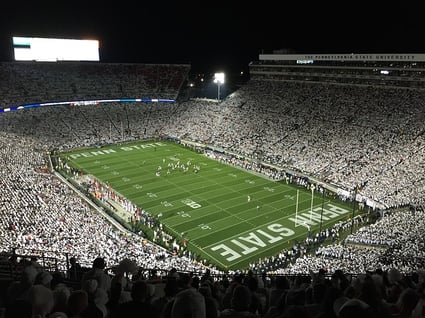
The Penn State essay is an important part of your Penn State application because it can make you stand out from other applicants!
What’s the Penn State Essay?
The Penn State essay, sometimes also called the Penn State supplemental essay, is a 500 word written response included in the Penn State application for admission .
The prompt for this essay invites applicants to tell the admissions committee about themselves. Here’s the prompt you’ll have to answer:
Please tell us something about yourself, your experiences, or activities that you believe would reflect positively on your ability to succeed at Penn State. This is your opportunity to tell us something about yourself that is not already reflected in your application or academic records. We suggest a limit of 500 words or fewer.
This essay prompt is essentially asking applicants to write a response that is very similar to what is known as a personal statement. College admissions typically use an applicant’s personal statement to better understand who the applicant is as a person and what strengths they will bring to the university.
In other words, the Penn State Essay response is an applicant’s chance to show what makes them unique in the admissions process.

3 Steps to Answering The Penn State Essay Prompt
If we break down the pieces of what the Penn State prompt is asking, we can identify three main tasks that you need to complete in order to write a killer essay . These tasks are as follows:
- Identify something about yourself (e.g. a skill, ability, character trait), one of your experiences, or an activity you have been involved in, and
- Explain the meaning or significance of that aspect of yourself in order to
- Prove that you embody what it means to be a Penn State student.
While whipping out a 500 word essay response that covers these topics may sound easy, it’s a bit trickier in practice. It’s important that you think carefully about your strategy and come up with a clear plan for your essay response. Remember: your essay is an important part of your admissions application, so you want to spend time getting it right.
Now, we’re going to walk you through how to address each of these three major points in your essay in order to make admissions counselors sit up and take notice.
Step 1: Select a Topic to Write About
To begin the process of drafting your Penn State essay, you need to select a meaningful attribute, experience, or activity that makes a positive case for your ability to succeed at Penn State . You need to identify these meaningful experiences or attributes because of the first part of the Penn State essay prompt, which states:
Please tell us something about yourself, your experiences, or activities that you believe would reflect positively on your ability to succeed at Penn State.
To do this, start by taking inventory of the character traits, experiences, or involvement in activities that you’re most proud of, passionate about, or are the most meaningful to you. We recommend you start by writing a list of the things that come to mind. If you want, you can divide it into categories based on character traits/abilities, experiences, and activities. As you put together this list, don’t worry about whether the things you’re coming up with are “good” or not — you’re just brainstorming ideas at this point!
If you’re stuck and have no idea where to start, that’s okay, too. Try asking yourself these questions to get you started:
- What is my favorite memory? And why?
- What’s my favorite thing to do in the whole world? Why do I love it?
- If my friends had to describe me in one word, what would they say?
Once you start jotting down ideas, you’ll probably find that you’re able to come up with quite a few. The traits, experiences, and activities that you list out can vary widely and come from different areas of your life, including experiences with friends and family, academic pursuits, extracurricular activities, work with community organizations and volunteerism, political activism, travels, strong memories from childhood, or challenges you’ve faced in life. The possibilities aren’t limited to the ones we just mentioned; this list is simply meant to give you a jump start for brainstorming.
Once you’ve listed out all the meaningful traits/abilities, experiences, and activities that you can think of, evaluate them in order to select one item from the list that you will address in your Penn State essay. To narrow it down to one item, consider asking yourself the following questions:
- Which of these items do I feel the strongest positive emotional connection to?
- Which of these items am I the most proud of?
- Which of these items could I tell a story about?
- Which of these items makes me unique or different from other people?
You don’t necessarily have to use these questions to select your essay topic, but if you find that you answer several of these questions with the same experience or activity, that might be a good clue that you should choose that item as the topic of your Penn State essay.

Once you pick a topic, it's time to figure out what it says about you as a person. This essay is designed to help admissions counselors get to know you.
Step 2: Think About What Your Topic Says About You
Once you’ve selected a single character trait/ability, experience, or activity from your list, the second step of responding to the Penn State essay prompt is to tell a compelling story.
You want to engage your reader while explaining what the trait/activity/characteristic you’ve chosen says about you as a person.
To get started on this step, it’s a good idea to do some freewriting or brainstorming. Try to identify the ways in which the experience or activity you chose showcased a talent, skill, or ability you possess in a meaningful or valuable way. It’s important to be able to explain your perception of how this experience or activity shaped you into a person who will bring something positive to Penn State.
Here’s what we mean: say Katerina has decided that she wants to write about making the varsity squad for her school’s soccer team. In her freewrite, she writes about how the accomplishment makes her feel (proud, excited, enthusiastic), and she also writes a bit about the hard work it took for her to get there. Not only does she jot down ideas about going to the State tournament and making a game-winning goal, she also writes about how she missed making the squad in 9th grade, but instead of quitting, she got up an hour early every day over the summer to fit in extra practice.
In this example, Katerina is trying to get a better understanding of why her topic is important to her, and what kind of story she can tell the admissions committee to help them understand her better. In this case, Katerina may decide to focus on how she didn’t give up and put in extra work to make her dreams come true...and it ended up paying off in a big way!
Keep in mind that it doesn’t matter if the item you choose to write about is the most prestigious accomplishment from your résumé — you have the rest of your Penn State application to account for those accomplishments. Rather, the Penn State Essay is your time to tell the story of the real person behind your long list of accolades. If you can tailor this story to focus on a specific, detailed experience, activity, or positive attribute you possess, your essay will be more impactful.
Step 3: Tie Your Story Back to Penn State
After you’ve nailed down the way that you want to describe your uniqueness as an applicant, you need to define your understanding of what success at Penn State means to you .
Why do you need to do this? Because of the instructions in the first sentence of the Penn State essay prompt, which states:
Please tell us something about yourself, your experiences, or activities that you believe would reflect positively on your ability to succeed at Penn State .
Penn State Admissions wants you to make a clear connection between your reflections on the experience you choose to write about and the opportunities for success that Penn State offers to its students. In order to make this connection effectively in your essay response, you need to explain how your story shows that you’re a perfect fit for Penn State.
To get started, do your research on the culture, identity, and opportunities provided for students at Penn State . Use any information you may have gathered from visits to Penn State’s campus, attending admissions events, talking with current students or alumni, or perusing Penn State’s website to help you construct a complete picture of the culture of Penn State and what the school has to offer.
Also, dig into specific opportunities you want to take advantage of while you’re attending Penn State. What does Penn State offer you that no other college can give you? Maybe that’s a specific degree plan, unique courses, or even a specific professor you want to work with. The more specific you are about how you’ll fit into the Penn State community, the better.
So let’s go back to Katerina. Katerina wants to be an engineer, and in her research, she learned that Penn State’s BEST Center is working on improving battery technology. Since Katerina wants to work in the tech field, the BEST Center will help her prepare for her future career.
So now Katerina needs to use her story about her soccer experience to explain how she’ll succeed as an engineering student at Penn State . One way she might do that is by saying that engineering is a demanding degree, and the persistence she learned on the soccer field will set her up for doing well as a Penn State engineering student. She could even take it a step further and explain that the creative problem solving she developed in her soccer training will help her succeed as she researches new battery technology as a part of the BEST Center, too.
This definition of “success” should inform how you tell the story of yourself in your Penn State essay. The admissions committee doesn’t expect every applicant to define success in the same way. In fact, Penn State admissions wants to see that you’ve really thought through your potential to be a good fit as a student at Penn State based on a thorough understanding of what Penn State has to offer a student with your past experiences and vision for the future. You should be able to define your path to success and explain how Penn State will help you get there.

If you're still not sure what your Penn State essay should look like, take a look at our example essay below.
A Penn State Essay Example
There are many different ways that a Penn State essay can be successful but, in general, excellent essays talk about a specific experience, tell a memorable story, and connect the story of that experience to your definition of success at Penn State.
To help you understand what these moves can look like in practice, let’s check out Penn State essay examples:
Every morning during the spring of my junior year of high school, my alarm went off at 4:45 a.m. Due to the coronavirus pandemic, many people in my hometown were laid off from their jobs struggling to make ends meet. My family owns a farm, and we grow many different types of vegetables and have laying hens, too. So when my morning chores were completed, I would jump in the truck with my dad and my sister to drive into town and deliver free vegetables and eggs to families in need.
My family could help others because of our farm. That made me think: what if other people could grow their own food and then share what they had with others? That’s why I started an online, community-based agriculture program at my school. I wanted to help others learn how to grow their own food, then share that food with others in their community.
While the group started out small with just a few students, within three weeks, 40 of my classmates joined in. Together, we organized a seed, plant, and garden tool drive that helped give 70 families in our town enough supplies to start their own small gardens. And many of my classmates have committed to growing gardens of their own! This experience taught me how important agriculture is, but also how agriculture can directly impact the well-being of those around me.
As a major in community, environment, and development at Penn State, I would have the opportunity to learn about and envision strategies for helping consumers in local communities become aware of and educated about the social and economic benefits to supporting their local farmers. By taking supplemental courses in computer programming, I would prepare myself to create user-friendly online spaces that are dedicated to sharing information about local food systems with consumers in local communities. Ultimately, I believe that Penn State will help me achieve my dream of starting a nationwide, online program to help people in undeserved communities start community agriculture programs of their own.
Now, let’s break down what this example essay does well. In this essay, the writer provides a clear definition of what success at Penn State will look like for them as a student. This essay emphasizes the student’s personal goals, knowledge of the opportunities Penn State has to offer, and commitment to investing in the Penn State community and society at large . That will definitely make an impact with admissions counselors!
This student also helps admissions counselors get to know them by telling a story that includes specific details and vivid imagery from an experience that other applicants may not have . The essay helps the reader get a better sense of who this person is, their background, and the things they care about by telling the short story about delivering homegrown care packages to people in the community. This story will help the admissions committee remember the applicant and will set them apart from other applicants as well.
But most essays aren’t perfect, and this one isn’t, either. One thing this essay response can improve upon is the way in which it connects the student’s idea of success to Penn State . In the last paragraph, the student should focus more on how specific opportunities provided by Penn State’s agriculture department, like its collaborative research into sustainable agriculture , will help the student achieve their goals.
All in all, t his Penn State essay provides a good example of how to address all aspects of the essay prompt , be clear and concise in your writing, and reveal important aspects of who you are as a person that your other application materials may not show.

3 Tips for Writing an Excellent Penn State Essay
You want your Penn State essay to persuade admissions that you’ll be a fantastic addition to Penn State’s incoming class. To help you present yourself in a way that Penn State admissions will remember, check out our three tips for writing an outstanding Penn State essay to help you stand out from the crowd.
Tip 1: Be Specific
If you want your Penn State essay to be memorable, you need to be specific . Throwing out a bunch of abstract character traits or claims as to why you’ll be successful at Penn State won’t help your essay stand out. Instead, give your essay a coherent focus by selecting one or two related character traits, experiences, or activities that show your ability to be successful at Penn State.
The point of the Penn State essay is to shoot for depth, not breadth. You already showcase your grades, coursework, and awards through other parts of your Penn State application. The essay is the time to reveal more about who you are and what you will bring to Penn State by showing how you’ve been successful in a past situation. Choosing a specific experience and diving into the details of it will show that you’re more than just a list of achievements on a résumé—you’re a real human being.
Tip 2: Give Concrete Examples
When writing your Penn State essay, examples are a crucial form of support. When you select one or two specific elements to focus on in your essay, you need to be able to elaborate on those things through specific and engaging examples.
For instance, you don’t want to simply say, “My adaptability to a range of situations predicts my potential for success as a student at Penn State.” An admissions committee may read that sentence and ask, What makes you so adaptable? What activities or experiences demonstrate evidence of your adaptability? What has your adaptability helped you achieve or accomplish?
Instead of making a vague, abstract claim like the one in the paragraph above, you need to be more specific, which you can do by providing an example .
Here’s how a writer could elaborate on their adaptability in their essay:
Starting your senior year of high school at a new school probably sounds daunting, but after moving seven times in seven years, I was prepared for the ins and outs of being the new kid on my last first day of school. Moving so many times due to my father’s work in the military has given me the opportunity to experience different cultures, learn new languages, and cultivate the ability to make meaningful connections with new people who are very different from me in a matter of minutes. During my senior year at a new school, I used these skills to mobilize my fellow students for a school wide walkout in support of DACA.
Do you see the difference? The example above gives specific details of what life experience led this student to become adaptable rather than simply making an unsupported claim .
This example is also memorable because it uses vivid language. When you read it, you can imagine the student traveling the world, confidently stepping foot into a new school, and building connections with fellow students for social action.
In your Penn State essay, examples like this one can be used to make meaningful connections between your vision for your life as a student and a clear definition of success . Using examples in this way will make your essay memorable and unique.
Tip 3: Don’t Rehash Your Résumé
It’s tempting to rehash the list of accomplishments on your résumé in your Penn State essay, especially if your résumé is packed full of prestigious awards and experiences. However, keep in mind that there are other areas of the Penn State application that explicitly ask for this information.
When the admissions committee sits down to read your essay response, they’re looking to learn something new about you—something that your résumé can’t tell them . So, instead of listing off accomplishments or stating the facts of what you’ve achieved, pick an aspect of who you are that might not be super apparent. That can include personality traits (maybe you’re really funny), unique experiences you’ve had (maybe you rescued kittens one summer!), or something else that makes you uniquely you.
Just remember: your essay is a chance for you to make a powerful impression on your readers, so don’t waste it!

Next Steps
If you’re applying to Penn State, you need to make sure you’re meeting some of the school’s other admissions requirements . Here’s a guide to the Penn State admissions process to get you started . You can also learn more about the Penn State ACT and Penn State SAT standards , too.
Are you looking for more college essay tips and tricks? Don’t worry: we’ve got 13 more for you!
If you’re applying to other schools besides Penn State, y ou may find that you have to write “Why This College?” essays . If you’re not sure what those are, be sure to check out this article.

Ashley Sufflé Robinson has a Ph.D. in 19th Century English Literature. As a content writer for PrepScholar, Ashley is passionate about giving college-bound students the in-depth information they need to get into the school of their dreams.
Student and Parent Forum
Our new student and parent forum, at ExpertHub.PrepScholar.com , allow you to interact with your peers and the PrepScholar staff. See how other students and parents are navigating high school, college, and the college admissions process. Ask questions; get answers.

Ask a Question Below
Have any questions about this article or other topics? Ask below and we'll reply!
Improve With Our Famous Guides
- For All Students
The 5 Strategies You Must Be Using to Improve 160+ SAT Points
How to Get a Perfect 1600, by a Perfect Scorer
Series: How to Get 800 on Each SAT Section:
Score 800 on SAT Math
Score 800 on SAT Reading
Score 800 on SAT Writing
Series: How to Get to 600 on Each SAT Section:
Score 600 on SAT Math
Score 600 on SAT Reading
Score 600 on SAT Writing
Free Complete Official SAT Practice Tests
What SAT Target Score Should You Be Aiming For?
15 Strategies to Improve Your SAT Essay
The 5 Strategies You Must Be Using to Improve 4+ ACT Points
How to Get a Perfect 36 ACT, by a Perfect Scorer
Series: How to Get 36 on Each ACT Section:
36 on ACT English
36 on ACT Math
36 on ACT Reading
36 on ACT Science
Series: How to Get to 24 on Each ACT Section:
24 on ACT English
24 on ACT Math
24 on ACT Reading
24 on ACT Science
What ACT target score should you be aiming for?
ACT Vocabulary You Must Know
ACT Writing: 15 Tips to Raise Your Essay Score
How to Get Into Harvard and the Ivy League
How to Get a Perfect 4.0 GPA
How to Write an Amazing College Essay
What Exactly Are Colleges Looking For?
Is the ACT easier than the SAT? A Comprehensive Guide
Should you retake your SAT or ACT?
When should you take the SAT or ACT?
Stay Informed
Get the latest articles and test prep tips!
Looking for Graduate School Test Prep?
Check out our top-rated graduate blogs here:
GRE Online Prep Blog
GMAT Online Prep Blog
TOEFL Online Prep Blog
Holly R. "I am absolutely overjoyed and cannot thank you enough for helping me!”
- Search All Scholarships
- Exclusive Scholarships
- Easy Scholarships to Apply For
- No Essay Scholarships
- Scholarships for HS Juniors
- Scholarships for HS Seniors
- Scholarships for College Students
- Scholarships for Grad Students
- Scholarships for Women
- Scholarships for Black Students
- Scholarships
- Student Loans
- College Admissions
- Financial Aid
- Scholarship Winners
- Scholarship Providers
Student-centric advice and objective recommendations
Higher education has never been more confusing or expensive. Our goal is to help you navigate the very big decisions related to higher ed with objective information and expert advice. Each piece of content on the site is original, based on extensive research, and reviewed by multiple editors, including a subject matter expert. This ensures that all of our content is up-to-date, useful, accurate, and thorough.
Our reviews and recommendations are based on extensive research, testing, and feedback. We may receive commission from links on our website, but that doesn’t affect our editors’ opinions. Our marketing partners don’t review, approve or endorse our editorial content. It’s accurate to the best of our knowledge when posted. You can find a complete list of our partners here .
How to Respond to the 2023-2024 Penn State Supplemental Essay Prompts

Varonika Ware is a content writer at Scholarships360. Varonika earned her undergraduate degree in Mass Communications at Louisiana State University. During her time at LSU, she worked with the Center of Academic Success to create the weekly Success Sunday newsletter. Varonika also interned at the Louisiana Department of Insurance in the Public Affairs office with some of her graphics appearing in local news articles.
Learn about our editorial policies

Cari Schultz is an Educational Review Board Advisor at Scholarships360, where she reviews content featured on the site. For over 20 years, Cari has worked in college admissions (Baldwin Wallace University, The Ohio State University, University of Kentucky) and as a college counselor (Columbus School for Girls).

Pennsylvania State University , commonly known as Penn State, is a public land-grant research university located in State College, Pennsylvania. It is widely known for its high ranking athletics and undergraduate degree programs. We are here to help you respond to the Penn State supplemental essays , so keep reading!
The Penn State prompts
The Penn State supplemental essays might be optional for all applicants, but going the extra mile shows your interest in the university and showcases your talents. Your story is important, and Penn State wants to hear about it. This is why they also include a supplemental essay for potential students that have taken time off before applying to college.
“ Optional : Please tell us something about yourself, your experiences, or activities that you believe would reflect positively on your ability to succeed at Penn State. This is your opportunity to tell us something about yourself that is not already reflected in your application or academic records. We suggest a limit of 500 words or fewer.”
This prompt is the classic “who are you beyond academics?” question. Penn State and many other colleges want to get to know their applicants to determine if it’s the right fit. It’s important for your personality to shine through in this essay, and being authentic is a necessary component.
Make your Penn State supplemental essay specific to you and your journey. Start by figuring out a main topic for your essay that isn’t so general that it could apply to any of the other applicants.
However, the story you share with the admissions office should relate to what you hope to accomplish or contribute to the Penn State community. This includes hobbies that might have inspired you to choose your major as well as ways you contributed to your current community in a way that you hope to make a similar impact at Penn State. You might also want to mention a course that Penn State exclusively offers that relates to an interest you have.
Apply to these scholarships due soon

$10,000 “No Essay” Scholarship

$2,000 Sallie Mae Scholarship

“Get Inspired” TikTok Scholarship

Niche $25,000 “No Essay” Scholarship

SKECHERS Financial Hardship Scholarship

$25k “Be Bold” No-Essay Scholarship

SKECHERS Academic Excellence Scholarship

SKECHERS Athletic Performance Scholarship

$2,000 No Essay CollegeVine Scholarship
Questions to consider.
- What is the story I want to tell Penn State?
- What are some notable experiences, interests, or hobbies that I have?
- Why did I choose to apply to Penn State?
Start your scholarship search
- Vetted scholarships custom-matched to your profile
- Access exclusive scholarships only available to Scholarships360 members
Remember: This prompt is only for applicants who are sending in their application sometime other than their senior year of high school.
“ Please use this space to explain any time that has elapsed between your high school graduation and your anticipated enrollment at Penn State. Please provide a summary of why that gap occurred. If you attended another college or university during that time, please note it below and ensure that you have entered the information in the Academic History section of this application . ( 500 words ) ”
Everyone’s college journey is different, with some not enrolling in college the fall after graduating high school. Whether you took a gap period to travel or to prepare for university, this is your opportunity to share your experience with Penn State.
You might’ve taken the time to travel, recoup from years in school, or start an entirely new adventure. You might have taken the time to seek experience and save money by working. Whatever your reasons, this supplemental essay prompt allows you to emphasize the importance of your gap period and how it has shaped you.
When writing your essay, try to include why you want to attend Penn State after your time off. Make them a part of your story, and explain how you hope to further develop once you attend.
Be aware of the word count, it’s a bit more fixed than the other supplemental essay prompt. It might be hard to hit the exact limit, so go back and proofread before adding any additional sentences. A couple words here and there are quick to stack up!
Also see: What is a gap year? Everything you need to know
- Why did I want to take a gap year?
- What did I accomplish during my gap year?
- How did taking this time shape me as a person?
- In what ways do I feel more prepared to start college now (specifically at Penn State)?
Don’t miss: Top reasons to take a break from college
Next steps for students
As you go through the college application process, mark your calendar with important deadlines! By doing this, you can accurately plan and get things done in advance. You could circle the date for admission notifications or schedule a campus tour.
Penn State has multiple campuses for applicants to choose from, and they also offer virtual tours, so you can get a quick look before visiting in person. The website even gives brief overviews of each location in Pennsylvania along with degrees, housing, and extracurriculars offered there.
Remember to check Penn State’s social media pages to stay updated on important events and dates. You’ll also be able to get a glimpse of what Penn State is like and how you might fit in there. Good luck on your path toward success!
Additional resources
Now you know how to ace the Penn State supplemental essays. But the work is not done! You can never be too prepared for college, so here’s a couple resources to make the transition smoother:
- Figure out the major that’s right for you
- Decide on applying early decision or early action
- Choose different types of scholarships to apply to
- How to write an essay about yourself
Other colleges to consider
- University of Michigan (Ann Arbor, MI)
- University of Illinois (Urbana-Campaign, IL)
- Purdue University (West Lafayette, IN)
Frequently asked questions about the Penn State supplemental essays
Can i apply to penn state through the common app, is the penn state optional supplemental essay worth writing, how long should the penn state supplemental personal essay be, scholarships360 recommended.

10 Tips for Successful College Applications

Coalition vs. Common App: What is the difference?

College Application Deadlines 2023-2024: What You Need to Know
Trending now.

How to Convert Your GPA to a 4.0 Scale

PSAT to SAT Score Conversion: Predict Your Score

What Are Public Ivy League Schools?
3 reasons to join scholarships360.
- Automatic entry to our $10,000 No-Essay Scholarship
- Personalized matching to thousands of vetted scholarships
- Quick apply for scholarships exclusive to our platform
By the way...Scholarships360 is 100% free!
Penn State will extend its offer acceptance deadline from May 1 to May 15, 2024, for incoming first-year students enrolling in the summer or fall 2024 terms. Penn State News Release
- Log in to MyPennState
How to Apply
Ready to start your Penn State story? Learn more about admission requirements, important dates, and other information to get you ready to apply.

Review the basic requirements for two-year and four-year degrees, as well as the additional requirements for special programs.

Follow these steps to complete your Penn State application.

Learn about the review process and what happens after you submit your application to Penn State.

Find out when you should apply and when you can expect a decision.

Compare your high school record with the academic credentials of our incoming first-year class and get a look at the University’s enrollment statistics.

Frequently asked questions regarding Penn State's new Early Action filing deadline.

Answers to frequently asked questions (FAQs) regarding the Test-optional evaluation process.

The MyPennState portal is where Undergraduate Admissions will collect and share information with you as you move through the admission process.

Access the application for admission in MyPennState .
Apply Today!

Information about Penn State's participation in the Common App.

Penn State's Commonwealth Campuses have partnered with Pennsylvania Community Colleges to provide a seamless Dual Admissions Program for students seeking to complete a four-year degree at Penn State.

Penn State accepts online applications through the MyPennState Application and the Common App.
How to write the Penn State essays
The recording will load in a moment., about this livestream, pennsylvania state university | penn state.
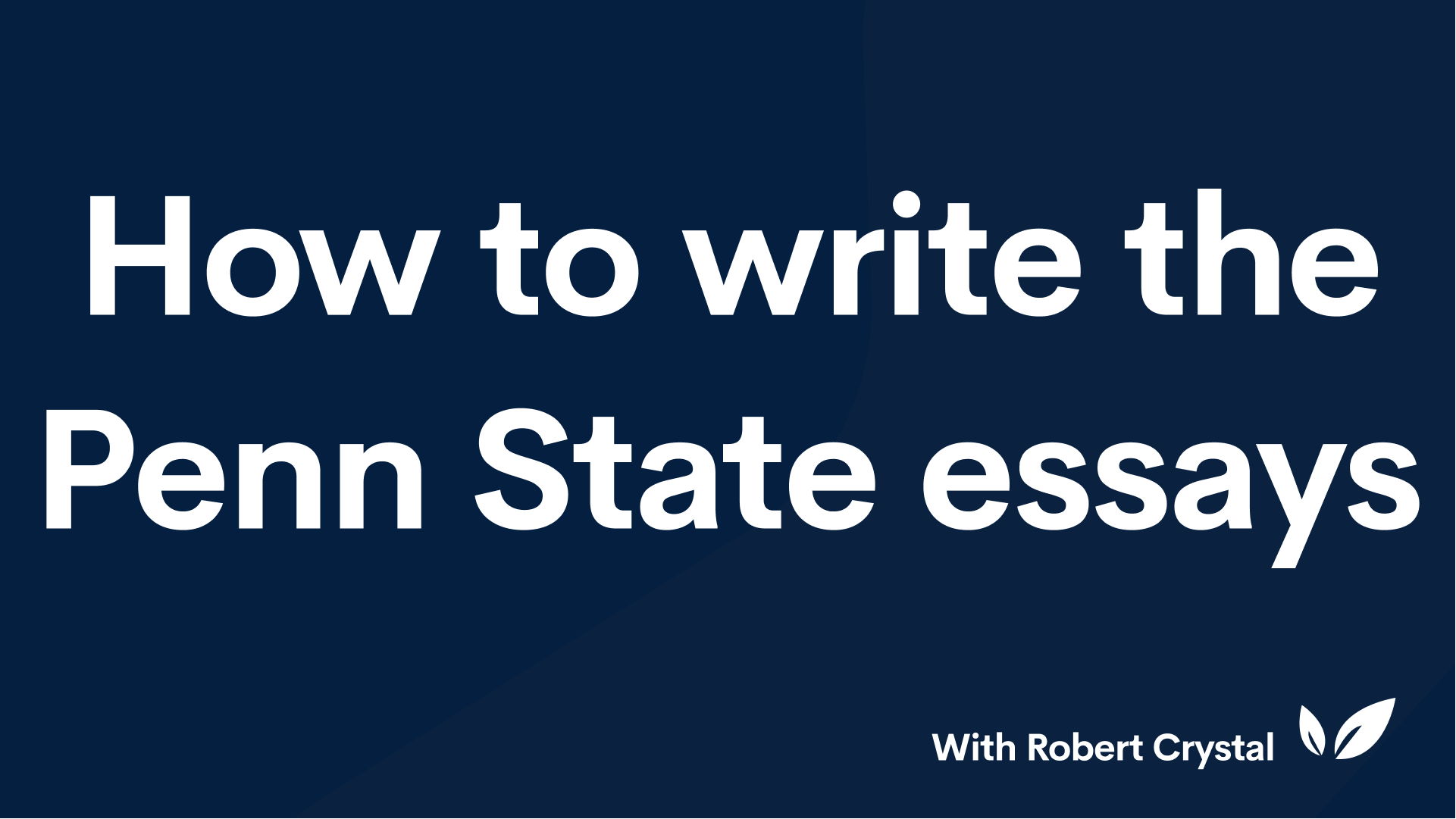
Known particularly for its flagship University Park campus, Pennsylvania State University is home to 24 campuses scattered throughout the state. Originally founded as Farmers’ High School of Pennsylvania in 1855, and it is widely known as a prestigious public research university today.
So, how do you get into this “Public Ivy”? One key to a standout application is by writing stellar essays. In this stream, Robert will cover how to write the optional all-applicant essays, as well as essays for the Schreyer Honors College and the BS-MBA program.
Come prepared to take notes and ask questions, as there will be time throughout the session for Robert to interact with you all, and a Q&A at the end!
Undergrad College: Yale University '21
Major: Ethics, Politics & Economics; Classics (Intensive)
Work Experience: As a recent graduate of Yale University, I am excited to begin my first year with CollegeVine! In many ways, CV was a natural fit for me -- at Yale, I worked for over two years in the Office of Undergraduate Admissions, beginning as a Senior Interviewer in the summer of 2019, during which I interviewed over 200 first-year applicants for the 2019-2020 college admissions cycle. After the summer ended, I became Lead Recruitment Coordinator, a full-time position responsible for executing and overseeing Yale’s numerous post-admissions decision yield initiatives, as well as serving as a spokesman for the university both in person and online. Over the past two years, I have had the privilege of interacting with hundreds of students and their families at all stages of the college application process.
My Admissions Story: Having always been interested in studying a variety of subjects within the Humanities and Social Sciences, I applied to a smattering of liberal arts colleges and universities (mostly on the East Coast) with strong departments in these areas, large and diverse student bodies, and varied extracurricular opportunities. When my college admissions decisions rolled in, I immediately accepted an offer from my dream school, Yale University, which I had always felt best embodied the opportunities and goals that I desired from my college experience -- and since that day, I’ve never looked back.
Other recordings about Pennsylvania State University
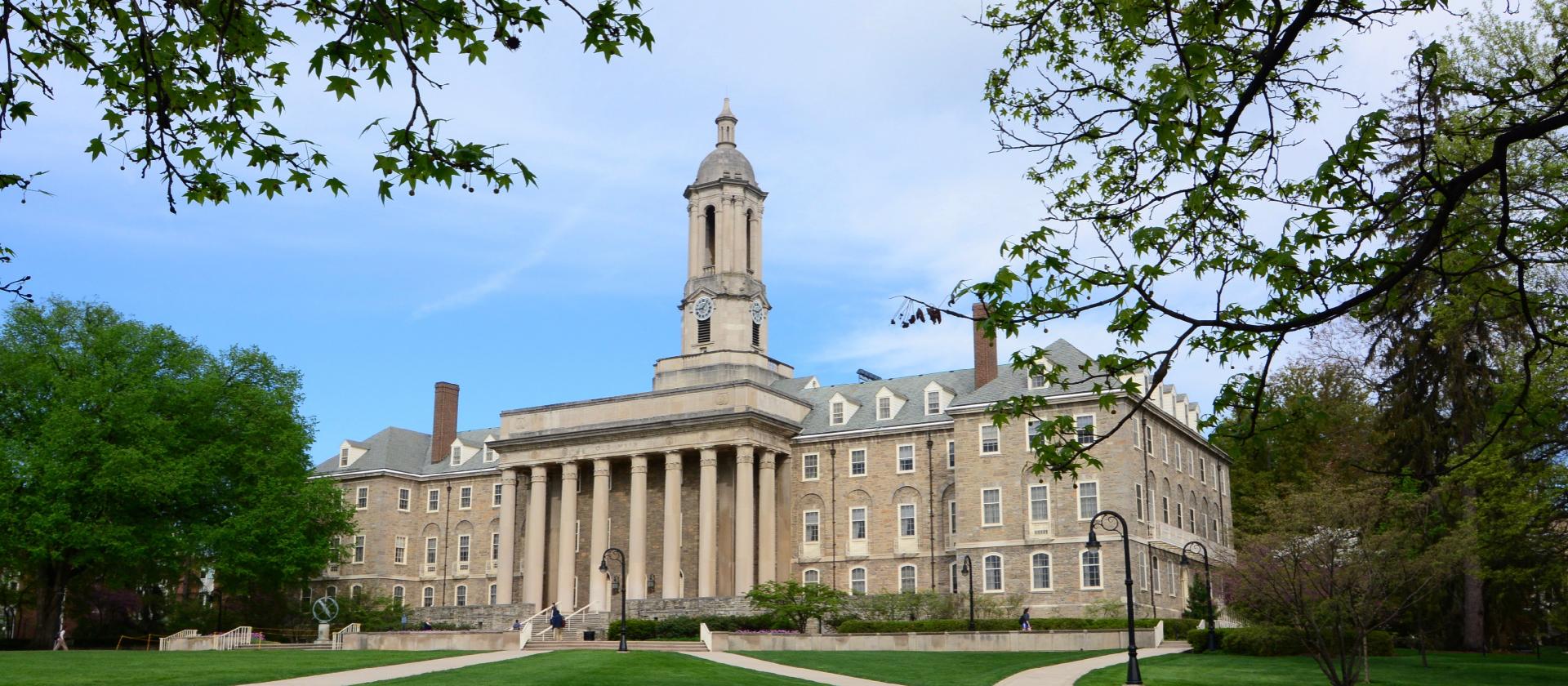
Pennsylvania State University Student Panel

Live Q&A With Current Penn State Students

Tips for Getting into Harvard from a Harvard Graduate
Popular recent recordings
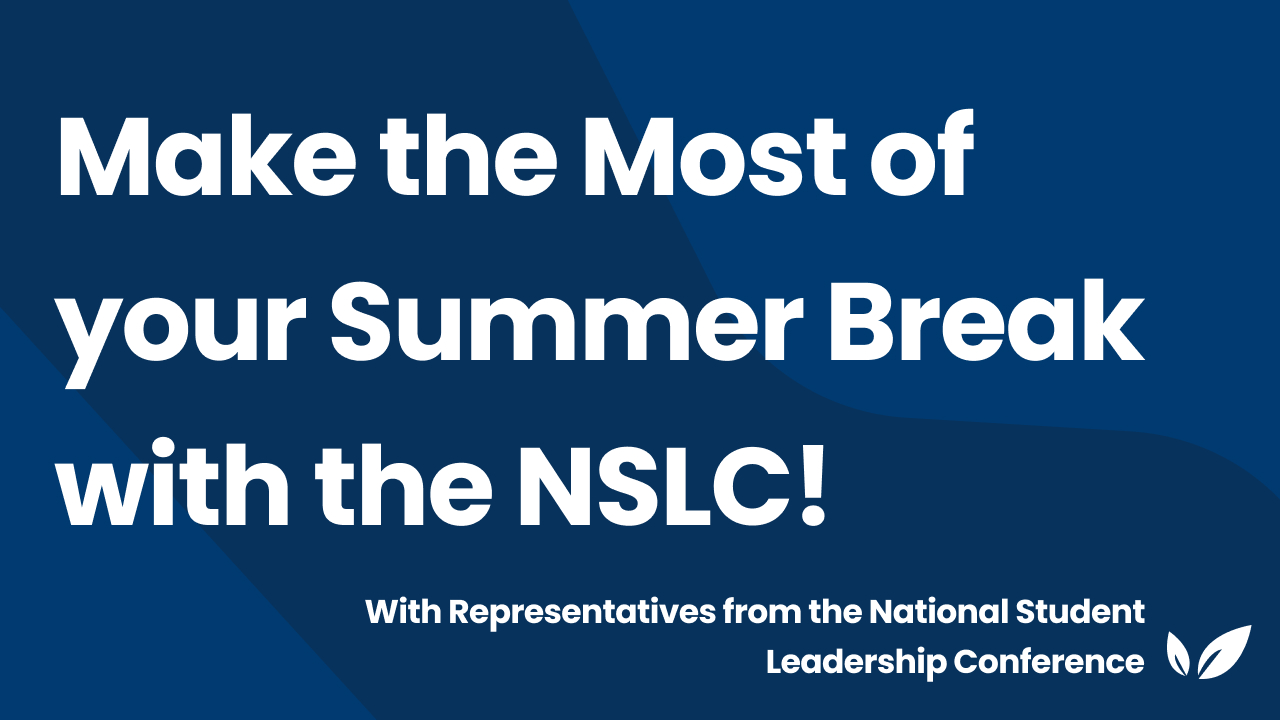
Make the Most of Your Summer Break with the NSLC!

Making the Most of your Summer with Matriculate
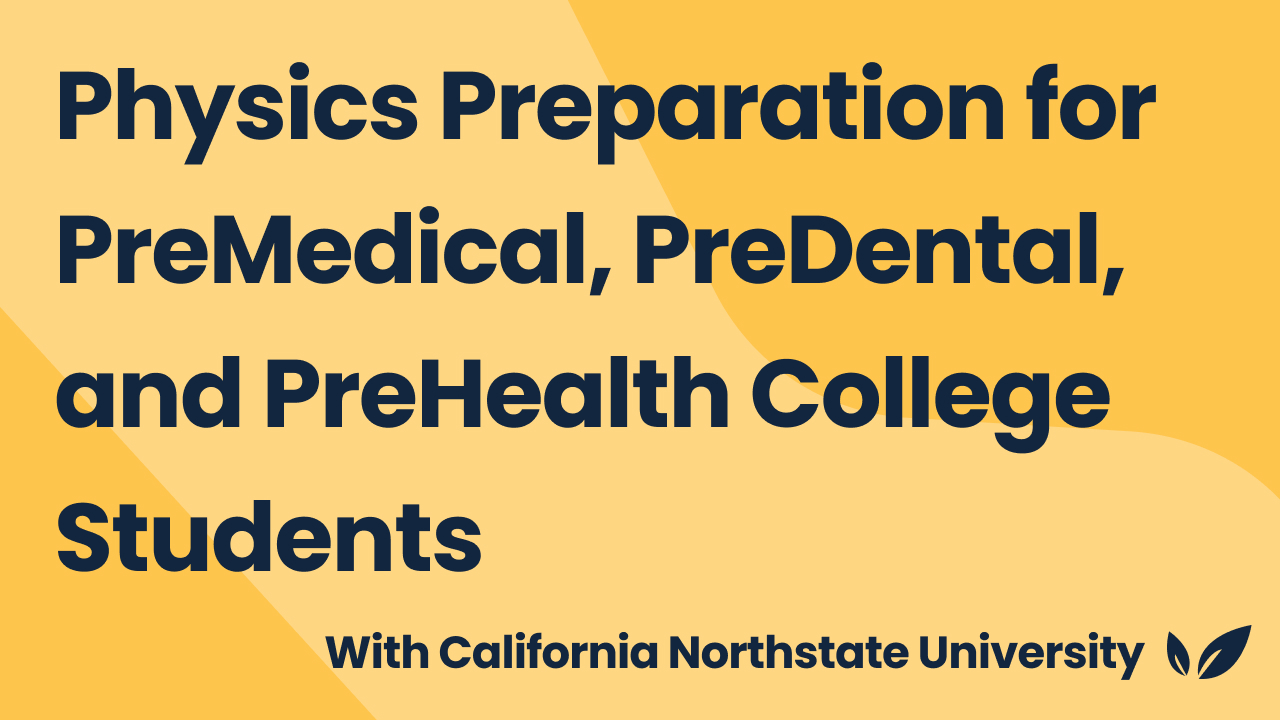
Physics Preparation for PreMedical, PreDental, and PreHealth College Students

I transferred to Harvard and how you can too
Join Us First-Year Students
Thank you for your interest in the Schreyer Honors College at Penn State!
The Honors College promotes achieving academic excellence with integrity, building a global perspective, and creating opportunities for leadership and civic engagement. Our student body is dynamic, diverse, and driven to change the world for the better.
We offer highly motivated high school students a rigorous undergraduate academic experience that combines all of the resources of one of the country's largest research institutions with all the benefits of a small liberal arts college.

More Than A Test Score Application Components
Application.
- Short Answers
Recommendations
- Academic Record
- Alumni Interview
To apply to the Schreyer Honors College, you'll need to complete two separate applications: the Penn State undergraduate application and the Schreyer Honors College application. We suggest you work on both applications at the same time, submitting the Penn State application first, and the Schreyer Honors College application second.
Application Platforms
The link to the Schreyer Honors College application will be displayed in the application portal once you indicate your interest in the Honors College.
Your Penn State and Schreyer applications are evaluated separately; decisions are made independently on the two applications.
Use whichever application platform you prefer, just remember to leave enough time to submit by the deadline!
Essay Questions
The Schreyer Honors College first-year application will have two essay questions, in addition to several shorter prompts. These questions change on a yearly basis and are meant to elicit well-written, comprehensive responses. Each essay response has a maximum word count of 800 words.
The essay questions are an opportunity to present your best self to the review committee, and there is no right answer to the prompts. Rather, reviewers will consider how or why you take a specific approach to each question looking for well-reasoned, consistent, and persuasive responses.
2024 Essay Questions
- Describe a problem you've solved or a problem you'd like to solve. It can be an intellectual challenge, a research query, an ethical dilemma - anything that is of personal importance, no matter the scale. Explain its significance to you and what steps you took or could take to identify a solution.
- Isaac Asimov wrote: “Any book worth banning is a book worth reading.” Do you agree? Is such censorship ever justified? If not, explain why. If so, who or what should determine which books are read and which books are forbidden.
Get started on your essays early — they are released on our website in July.
There is no right or wrong essay answer — just answer the question to the best of your ability. Our questions are designed to push you to think, do some research, and apply your knowledge. Be honest, be genuine, and allow your character and personality shine through your writing.
Short Answer Questions
The Schreyer Honors College asks a handful of short answer questions to obtain information regarding honors and achievements, leadership positions, activities and service. These questions have a 200 word limit and may change without notice, so please be sure to check back before starting your application.
2024 Short Answer Questions
- What do you hope to get at Penn State as a Schreyer Scholar to help you accomplish your future goals and aspirations?
- If you were able to go anywhere in the world, outside of the country you currently reside, where would you go and why?
- Tell us about your leadership experiences (community roles, family contributions, research, clubs, organizations, etc.) and why leadership is important to you. Describe the challenges and/or successes you’ve faced in these roles.
- List awards or other recognitions you have received in or outside of school over the last 4 years. Which award or recognition means the most to you and why.
- Tell us about a book or other media that has made you think about something in a new way.
- Consider a time when you had to collaborate with individuals from diverse backgrounds or with different perspectives. How did this experience contribute to your personal growth and understanding of others?
- Everyone belongs to many different communities and/or groups, including: shared geography, faith, ethnicity, income, cuisine, interest, race, or intellectual heritage. Choose one of the communities or groups to which you belong and describe how it has influenced your life over the last four years.
- Please use this space to share information you would like us to consider that has not been discussed elsewhere in your Schreyer Honors College application. This could include obstacles you’ve overcome, something you’re proud of that is not discussed elsewhere, or anything else you choose.
Want to share your creative talents and accomplishments? You're welcome to submit this information electronically via the last short answer question.
As with the essay questions, we want to get to know who you really are. Let the true you shine through.
As part of the Schreyer Honors College application process, potential Scholars are required to submit a minimum of two and a maximum of 4 letters of recommendation. Recommendations can be from a teacher, a guidance counselor, a coach, or club advisor.
Common Application
If your school uses a system that connects to the Common App and you applied to Penn State through the Common App, your letters of recommendation that you submitted through your school's system or via the Common App will be sent to the Honors College. No further action is necessary.
If you are working with a recommender who is not affiliated with your school and they cannot submit a letter of recommendation through your school's system, please follow the directions below.
Alternate Instructions
If one of your recommenders is unable to submit their letter of recommendation via the Common App, Naviance or SCOIR, please follow the instructions below.
- Print the Letter of Recommendation Cover Sheet
- Fill out the cover sheet completely
- Give the cover sheet to your recommender.
- The recommender should include both the completed cover sheet and their letter of recommendation in an e-mail to [email protected]
Please be considerate by giving your recommender ample time to complete and submit recommendations on your behalf. Also, please do not ask recommenders to upload recommendations via multiple methods as this will greatly slow down the processing of your application.
The methods outline above are the only methods through which letters of recommendation will be received. Please do not send recommendations to the Penn State Undergraduate Admissions Office as doing so will delay processing of the documents.
Note: It is solely the applicant's responsibility to ensure that all required documents are received by the final deadline of December 4 at 11:59 PM EST.

Schools that participate with Naviance or use The Common Application may upload recommendations to Penn State through these portals.
Alternatively, letters may be sent via e-mail to [email protected] .
Self-Reported Academic Record
Your Self-Reported Academic Record (SRAR) must be submitted as part of your Penn State application. This process replaces having school counselors send academic transcripts for each applicant.
The Schreyer Honors College will review and rate your academic record as it relates to the opportunities offered at your particular high school.
We do not use standardized test scores in our evaluation as we've found them to be an inaccurate predictor of student success. In our opinion, one of the best predictors of future performance is prior performance; therefore, your course load and academic rigor in high school are the most important pieces of information we review.
Make sure to enter your grades exactly as they appear on your high school transcript.
If you are offered admission to Penn State, your final high school transcript will be sent to the University.
Optional Alumni Interview
If we receive your application by November 1, you will be invited to participate in an optional interview as part of the selection process.
The goal of this interview is to have a comfortable conversation with one of our alumni volunteers. They are eager to meet you, learn more about your interest in the Schreyer Honors College and share with you some of their Penn State experiences.
Please note that as this is an optional interview, your application will not be negatively impacted if you are not able to participate.
Our admissions interview is not intended to make you nervous or afraid — our alumni just want to have a conversation with you and get to know you better.
Interviews usually last half an hour, keep that in mind and use this time wisely.
Stay on Track First-Year Admission Checklist
Use this at-a-glance checklist to keep your Schreyer application on track.
June & July
October & november, march & april, visit penn state & the schreyer honors college.
There is no better way to see if a college is right for you than by setting foot on campus and getting a feel for the place. Not able to visit in the summer? Don't worry — Penn State has visitations year-round!

Begin Working on Your Essays
The Schreyer Honors College essay questions are posted in mid-July to give you plenty of time to craft well-written, comprehensive responses by our application deadlines.
Create a MyPennState Account
Create a MyPennState account, and explore the Penn State University undergraduate application website. Learn about application requirements, academics, student life, and costs. Plus, you can chat with a current Penn State student.
Schreyer and Penn State Applications Open
The Penn State undergraduate admissions application and the Schreyer Honors College application open on August 1. There are two portals available through which you can apply to both Penn State and the Schreyer Honors College — MyPennState and the Common Application. Students are encouraged to indicate their interest in applying to the Schreyer Honors College on the Common Application. If a student indicates they are not interested in applying or would like to apply at a later date and have submitted their Penn State undergraduate admissions application they can still access the Schreyer Honors College application through MyPennState.
Attend Scholars Day
This annual fall open house gives you a comprehensive look at what Penn State and the Schreyer Honors College have to offer.
Penn State Early Action & Optional Interview Deadline
The early application deadline for Penn State is November 1. Students who apply by this date will receive a decision from the University by December 24.
If you submit your application by 11:59 PM EST on November 1, you will be eligible to schedule an optional alumni interview. Please note that only your application is due by this date; your letters of recommendation may come later.
Note: All the materials for the Schreyer Honors College application must be submitted online. If you wish to submit applications that are audio or visual representations of your work, publish them online and include links in the appropriate section of the Honors College application. No offline material will be accepted or reviewed.
Admissions Interview Signup Opens
The Admissions Interview portal will open for students who have submitted their Honors College application. Interview spaces are limited and assigned on a first-come, first-served basis. All interviews must be scheduled and completed between November 10 and January 16.
Final Application Submission Deadline
If you weren't able to finish the application by the priority deadline in November, our final submission deadline is December 4. In order to meet this deadline, you must have submitted an application for both Penn State and the Schreyer Honors College and have submitted all of the required documentation for both applications by December 4 at 11:59 PM EST .
Recommendation Letters
All letters of recommendation must be submitted online by December 4 at 11:59 PM EST .
Admissions Decision
Look for your Schreyer Honors College admission decision online in mid February to early March . We'll notify you in advance by e-mail of the date and time our admissions decisions go live. Good luck!
If you have been accepted to Penn State, consider waiting until you have your Schreyer decision to schedule your accepted student visit.
Accepted Student Receptions
If you have been accepted to the Schreyer Honors College, consider attending one of our many Accepted Student Receptions held in March and April. Information regarding these events will be posted online.
Offer Acceptance and Housing Selection Deadlines
The deadline for accepting a Penn State and Schreyer Honors College offer is May 15 at 11:59 PM EST . Incoming Scholars also need to select their on-campus housing option by May 20.
New Student Orientation
Information about New Student Orientation (NSO) for incoming first-year Scholars will be posted soon.
What We Look For Application Review Process
While the Penn State Undergraduate Admissions Office will evaluate your credentials for admission to the University, the Schreyer Honors College will conduct its own evaluation. These evaluations are conducted completely independently of each other, however, your entrance into the Honors College depends on receiving an offer from Penn State.
Schreyer is ultimately looking for well-rounded students that excel both inside and outside of the classroom. We pride ourselves on fostering a diverse community of difference makers here in the Honors College and keep that in mind as we review applications.
Selection Committee
As part of your evaluation, your application will be read by at least two members of our Selection Committee. Applications are assigned to these readers randomly and are anonymized as much as possible. Selection Committee members will read and rate (via a norming process) all of their assigned applications. These ratings, along with reader comments, are used to help determine your admissions decision.
Optional Admissions Interview
If you apply by the optional interview date (November 1), you will have the opportunity to request an optional admissions interview with a Scholar alumnus/alumna. Interview availability is offered on a first-come, first-served basis, so please register as soon as possible if you are interested. Every attempt will be made to match alumni volunteers with applicants, but due to alumni availability, the College cannot guarantee that every request will be honored.
Alumni interviewers are asked to submit ratings and comments based on the conversation they have with you. Just be yourself and let your passion shine through. The interview is also an opportunity for applicants to learn more about life as a Scholar at Penn State.
Please note that alumni interviews are completely optional. The applications of students who do not select or were unable to participate in the optional alumni interview are not negatively impacted. Final admissions decisions are based on the material submitted as part of the student application.

I decided to enroll in the Schreyer Honors College as I needed the atmosphere. In a big campus like Penn State, it’s easy to feel overwhelmed and like just another face in the crowd, so it was important to me to find a setting where I could stand out. The Honors College has allowed me to make many close friends, very quickly, who challenge me to become the best version of myself. John Barton ' 23 Nuclear Engineering

Pennsylvania State University Essay Guide 2019-2020
Found in the heart of Pennsylvania, Pennsylvania State University (PSU) is a public, land-grant university with a multitude of locations and the primary campus being at University Park, Pennsylvania. PSU has an undergraduate body of over 40,000 students, with an admission rate hovering in the low to mid-50s over the past three years. For the Class of 2022, the middle 50% of applicants had a high school GPA between 3.55-3.97 out of a 4.0 scale and SAT score between 1250-1430 or ACT score between 28-32.
According to the 2017 US News & World Report , PSU ranks #50 overall for best college experience for undergraduates and is ranked #14 among national public universities. Many factors contribute to a student’s evaluation: academic record, standardized test scores, personal statements, cultural and geographic background, and activities. PSU strives to look at the holistic individual and chooses a diverse class of students in all aspects of life.
For students admitted for Fall 2019 and following, PSU has slightly modified its general education curriculum. The baccalaureate degree consists of no less than 120 credits, where students are permitted to take courses beyond the minimum. PSU allows for early action admission, direct application into a major of study granted the student satisfies requirements and also has several special accelerated programs. To list a few at the University Park campus, there is the seven-year BS/MD program, the five-year BS/MBA, the Schreyer Honors College, and many more at one of 18 other PSU affiliated campuses.
To help you with the writing process, we wrote this essay guide specifically for PSU’s supplemental essays. For more guidance on personal essays and the college application process in general, sign up for a monthly plan to work with an admissions coach 1-on-1.
The Penn State Essay Prompts
Prompt 1: please tell us something about yourself, your experiences, or activities that you believe would reflect positively on your ability to succeed at penn state. this is your opportunity to tell us something about yourself that is not already reflected in your application or academic records. we suggest a limit of 500 words or fewer..
With the incredible amount of applications submitted each year, try to make the admission officer’s job easier by writing a concise, unique, fluid essay . The essay should tell a story that gives the officer an idea of what kind of person you are while allowing yourself to show off a bit . For example, have you participated in community service or have volunteering experience that has taught you a lesson that can translate to your success at Penn State? Do you play any instruments or sports that have allowed you to travel or gain insight into other cultures? Are you from a military background, has the process of moving to different homes helped you learn to adapt quickly?
To find that desired topic I suggest creating a list of experiences or activities and then writing a short description for each one. This will help with the second prompt because, even if the topic you start with doesn’t end up being the final choice, you can start to pick the activities that mean the most to you. Also, you will have already started brainstorming and writing about your general experiences that may be useful in essays for other schools.
Prompt 2: Please use this space to list or discuss your activities other than academic work during the last several years (for example: school organizations, jobs, athletics, the arts, community service, religious groups, or other individual interests). You may already have an activities resume or list prepared and should feel free to paste it into the space below. We suggest a limit of 500 words or fewer.
The key to this prompt is to brainstorm a few categories (e.g. traveling) in addition to the ones listed and write a quick sentence or two about each activity within that category. Make sure that the description highlights the key takeaways from each activity as you want to try and keep the supplemental essay under 500 words. However, even if the word total exceeds 500, don’t fret as the flow and significance of the activities can mean more to the admissions officer.
If you have only a few activities you would like to describe, feel free to go into more detail and write a compelling story so that the admission officer can understand your passion for said activities. However, if you have too many topics and are unable to sufficiently describe each activity, you can pick one for each category or choose which are most important to you.
Other Program-Specific Prompts
5 year ms/mba of eberly college of science, prompt 3. select the scientific discipline above that is most interesting to you. why do you want to devote 4 years of college studying it (astronomy & astrophysics, biochemistry and molecular biology, biology, biotechnology, chemistry, mathematics, microbiology, physics, statistics) (200 words max).
Think about what has interested you in and out of school, do you have a curiosity or passion for any of these subjects? Have you considered how business will factor into your academic plans?
Prompt 4: Inclusiveness and Diversity: In an increasingly global community, it is essential that students gain cultural competency. In what way have you demonstrated a commitment to this mission? (200 Words Max)
Cultural competency refers to your ability to communicate and interact with people of different cultures. This could be attributed to traveling to different countries or meeting people of various backgrounds in your neighborhood. In this essay, you should demonstrate that you are able to recognize your own views, acknowledge cultural differences, have a positive attitude towards others, and plan to continue doing all of these things in the future.
Prompt 5: Goals: Discuss your career aspirations. How would the Science BS/MBA program help you reach those goals? (200 Words Max)
Your career aspirations can be at any moment after graduation, even 20 years down the road. What is important is that you have some idea of where you what to be at each stage and that you include it in your response. You should also do research on this program, find out what previous graduates did, and look at the curriculum to determine what this program has to offer that is unique and interesting to you.
Prompt 6: Leadership: Please discuss your leadership and collaboration skills. Give recent examples of how they have been demonstrated. (200 Words Max)
Pick one or two examples at most to effectively paint a complete story of you as a leader. If you are unable to think of an example, explain a hypothetical but realistic situation where you can showcase your leadership and collaboration skills.
Prompt 7: Resiliency: Transitioning to college can be a challenge. Discuss the adjustments you believe you will need to make in order to be successful as you transition from high school to a college environment. (200 Words Max)
Whether you believe you need to make adjustments or have already made them, make sure you include a broader list and then narrow down the answers to respond to this prompt.
Prompt 8: Describe your biggest commitment. (150 Words Max)
This prompt allows some flexibility if you think one aspect of yourself has not been thoroughly showcased, you are able to go into more depth here.
Prompt 9: Describe a time when you helped someone else succeed. (150 Words Max)
Think about your family, friends, peers, or even strangers and create a list with a brief description under each potential answer.
Prompt 10: Using three adjectives, how would you like others to perceive you? (3 Words Max)
Do not overthink this answer , one solution could be to try and summarize your previous prompts so that each adjective has a supporting essay to go along with it.
Schreyer Honors College
Prompt 11: describe a typical day in your life in 2050. consider what your professional life will look like, what technologies you might use, and how you will interact with your personal network (friends, family, etc.) and the world at large..
This prompt allows you to be creative, but you should contain your answers to what you would be able to gain specifically from being a Schreyer Honors student (i.e. the network perks and additional educational benefits). Try to look for previous Schreyer Scholar testaments to the benefits of being one of these students.
Prompt 12: Describe a situation in which you moved outside your comfort zone, interacting with people whose experiences and/or beliefs are different from your own. What was your initial response and how did you adapt? Walk us through the situation and explain what impact it had on you.
Approach this question in a multitude of ways:
- Have you traveled to a new country with family or by yourself?
- Have you met anybody during community service who has left a lasting impact?
- Did you partake in work that involved being adaptive?
Regardless of the specific situation, be sure to include how you were initially presented with an uncomfortable situation, how you thought to remedy the situation, what you chose to execute in action, and the overall response.
Prompt 13: “A picture is worth a thousand words” refers to the notion that a complex idea can be conveyed with just a single picture. If you could submit a selfie from anywhere in the world that would tell us about your beliefs and passion, where would you take this photo? What insight would this photo provide about you?
Again, think about what you want to show the admissions officer that you have been unable to explain in previous essays or your resume.
This essay guide was written by Victor Shen , PSU Class of 2018. If you want to get help writing your PSU application essays from Victor or other CollegeAdvisor.com Admissions Experts , register with CollegeAdvisor.com today.
Personalized and effective college advising for high school students.
- Advisor Application
- Popular Colleges
- Privacy Policy and Cookie Notice
- Student Login
- California Privacy Notice
- Terms and Conditions
- Your Privacy Choices
By using the College Advisor site and/or working with College Advisor, you agree to our updated Terms and Conditions and Privacy Policy , including an arbitration clause that covers any disputes relating to our policies and your use of our products and services.
- FRONT MATTER
- TABLE OF CONTENTS
Chapter 4: Sample Personal Statements and Application Essays
Easy writing makes hard reading.
—Ernest Hemingway
As a graduate student taking fiction writing workshops many moons ago, I recall what was most motivating to me as a creative writer. It wasn’t the reading of published or award-winning work, and it wasn’t the classroom critique given on high from the professor nor the scribble from my classmates on my manuscripts. All these things were helpful and valuable, but nothing motivated me more than comparing my fiction to the work of my peers. As I read their work carefully, both objectively and subjectively, I found myself thinking at times that I was sure I could write better than the others around me at the seminar table—then I’d read an artful, poignant story that made me wonder whether I could ever even compete.
Perhaps somewhere between these two attitudes is the most profitable approach when studying the work of your peers. In critiquing the work of others who essentially represent your competition, you should take a respectful stance both critical and kind, just as selection committee members are likely to do. The sample essays in this chapter represent personal stories that are intriguing, diverse, complex, honest, and humanizing. These samples present opportunities for you to study, admire, question, emulate, reject, and—most importantly—consider how to present the best, truest, most effective picture of yourself, carefully refined for the eyes of others.
Websites with sample personal statements abound. Here are two:
Sample personal statements categorized by major at eduers.com
Sample personal statements including reader comments from studential.com
- Short Essay Samples
- Sample Resumes
- Lengthy Essay Samples
- Professional Essay Samples
Home — Essay Samples — Education — College Education — Penn State University Application
Penn State University Application
- Categories: College Education
About this sample

Words: 472 |
Published: Mar 20, 2024
Words: 472 | Page: 1 | 3 min read

Cite this Essay
Let us write you an essay from scratch
- 450+ experts on 30 subjects ready to help
- Custom essay delivered in as few as 3 hours
Get high-quality help

Prof. Kifaru
Verified writer
- Expert in: Education

+ 120 experts online
By clicking “Check Writers’ Offers”, you agree to our terms of service and privacy policy . We’ll occasionally send you promo and account related email
No need to pay just yet!
Related Essays
3 pages / 1214 words
1 pages / 598 words
1 pages / 472 words
1 pages / 533 words
Remember! This is just a sample.
You can get your custom paper by one of our expert writers.
121 writers online
Still can’t find what you need?
Browse our vast selection of original essay samples, each expertly formatted and styled
Related Essays on College Education
In the United States, the choice between attending a community college or a four-year university is a significant decision for many individuals pursuing higher education. While both options offer valuable educational [...]
For generations, the pursuit of higher education has been regarded as an almost unassailable pathway to success. However, in the 21st century, the landscape of success and career achievement is undergoing a transformation. This [...]
Higher education is valuable for individuals and society as a whole. It enhances personal growth, improves career prospects, and fosters a well-rounded society. Baum, S., & Ma, J. (2016). Trends in College Pricing 2016. The [...]
Choosing the right educational path is a pivotal moment in an individual's life, with far-reaching implications for their future career and personal growth. The decision often boils down to two main options: trade school and [...]
As Matshona Dhliwayo once said, “Money doesn’t grow on trees, but grows on intelligent minds.” The idea of whether college should be free has been a controversial and widely debated topic. Imagine living in an old, [...]
In today's rapidly evolving world, the importance of a college education has never been more crucial. As technology advances and the job market becomes increasingly competitive, a college degree has become a necessity for [...]
Related Topics
By clicking “Send”, you agree to our Terms of service and Privacy statement . We will occasionally send you account related emails.
Where do you want us to send this sample?
By clicking “Continue”, you agree to our terms of service and privacy policy.
Be careful. This essay is not unique
This essay was donated by a student and is likely to have been used and submitted before
Download this Sample
Free samples may contain mistakes and not unique parts
Sorry, we could not paraphrase this essay. Our professional writers can rewrite it and get you a unique paper.
Please check your inbox.
We can write you a custom essay that will follow your exact instructions and meet the deadlines. Let's fix your grades together!
Get Your Personalized Essay in 3 Hours or Less!
We use cookies to personalyze your web-site experience. By continuing we’ll assume you board with our cookie policy .
- Instructions Followed To The Letter
- Deadlines Met At Every Stage
- Unique And Plagiarism Free

The Penn application process includes a personal essay as well as supplemental short answer prompts. We read your words carefully, as they are yet another window into how you think, what you value, and how you see the world. Through your writing, we get a glimpse of what you might bring to our community, including your voice and creativity.

- Apply for Admission
- International Applicants
- Transfer Admission
- Comprehensive Review
- Extracurricular-Activities
- High School Preparation
- Alumni Conversations
- Letters of Recommendation
- Supplementary Materials
- Incoming Class Profile
Before you begin writing:
- Review the prompt thoroughly. Be sure you’re answering the question or prompt being asked. T opics are chosen because the Admissions Committee wants to know specific things about you. If you don’t address the them directly, we are left to make decisions regarding your application with incomplete information.
- Consider your response carefully. We understand that you may be writing responses for different schools and you may want to reuse material, but read through your response to make sure the content is relevant to the prompt.
- Double check your writing. Give yourself time to revisit your response. Do not rush your writing process; create space in your schedule to revise your work. Ultimately, it is up to you to polish your response before you submit.
In your Penn supplemental short answers, be precise when explaining both why you are applying to Penn and why you have chosen to apply to that specific undergraduate school. Some of our specialized programs will have additional essays to complete, but the Penn supplemental prompts should address the single-degree or single-school choice.
2023-24 Short Answer & Essay Prompts
Penn Supplemental Short Answer Prompts (Required)
- Write a short thank-you note to someone you have not yet thanked and would like to acknowledge. (We encourage you to share this note with that person, if possible, and reflect on the experience!) (150-200 words, only required for first year applicants)
- How will you explore community at Penn? Consider how Penn will help shape your perspective, and how your experiences and perspective will help shape Penn. (150-200 words)
- The school-specific prompt will now be unique to the school to which a student is applying. Considering the undergraduate school you have selected, please respond to your school-specific prompt below. (For example, all applicants applying to the College of Arts and Sciences will respond to the prompt under the “College of Arts and Sciences” section).
For students applying to the coordinated dual-degree and specialized programs, please answer this question in regard to your single-degree school choice; your interest in the coordinated dual-degree or specialized program may be addressed through the program-specific essay.
Transfer Essay (required for all transfer applicants): Please explain your reasons for transferring from your current institution and what you hope to gain by transferring to another institution. (4150 characters)
Penn Nursing intends to meet the health needs of society in a global and multicultural world by preparing its students to impact healthcare by advancing science and promoting equity. What do you think this means for the future of nursing, and how do you see yourself contributing to our mission of promoting equity in healthcare? (150-200 words)
To help inform your response, applicants are encouraged to learn more about Penn Nursing’s mission and how we promote equity in healthcare . This information will help you develop a stronger understanding of our values and how they align with your own goals and aspirations.
The flexible structure of The College of Arts and Sciences’ curriculum is designed to inspire exploration, foster connections, and help you create a path of study through general education courses and a major. What are you curious about and how would you take advantage of opportunities in the arts and sciences? (150-200 words)
To help inform your response, applicants are encouraged to learn more about the academic offerings within the College of Arts and Sciences . This information will help you develop a stronger understanding of how the study of the liberal arts aligns with your own goals and aspirations.
Wharton prepares its students to make an impact by applying business methods and economic theory to real-world problems, including economic, political, and social issues. Please reflect on a current issue of importance to you and share how you hope a Wharton education would help you to explore it. (150-200 words)
To help inform your response, applicants are encouraged to learn more about the foundations of a Wharton education . This information will help you better understand what you could learn by studying at Wharton and what you could do afterward.
Penn Engineering prepares its students to become leaders in technology, by combining a strong foundation in the natural sciences and mathematics, exploration in the liberal arts, and depth of study in focused disciplinary majors. Please share how you hope to explore your engineering interests at Penn. (150-200 words)
To help inform your response, applicants are encouraged to learn more about Penn Engineering and its mission to prepare students for global leadership in technology . This information will help you develop a stronger understanding of academic pathways within Penn Engineering and how they align with your goals and interests.
Coordinated Dual Degree and Specialized Programs Short Answer Prompts
For students applying to the coordinated dual-degree and specialized programs, please answer the program-specific essay below.
** Character count that only applies to transfer students applying through Common App.
Why are you interested in the Digital Media Design (DMD) program at the University of Pennsylvania? (400-650 words / 3575 characters**)
The Huntsman Program supports the development of globally minded scholars who become engaged citizens, creative innovators, and ethical leaders in the public, private, and non-profit sectors in the United States and internationally. What draws you to a dual-degree program in business and international studies, and how would you use what you learn to contribute to a global issue where business and international affairs intersect? (400-650 words)
The LSM program aims to provide students with a fundamental understanding of the life sciences and their management with an eye to identifying, advancing, and implementing innovations. What issues would you want to address using the understanding gained from such a program? Note that this essay should be distinct from your single degree essay. (400-650 words)
- Explain how you will use the M&T program to explore your interest in business, engineering, and the intersection of the two. (400-650 words)
- Describe a problem that you solved that showed leadership and creativity. (250 words)
Describe your interests in modern networked information systems and technologies, such as the internet, and their impact on society, whether in terms of economics, communication, or the creation of beneficial content for society. Feel free to draw on examples from your own experiences as a user, developer, or student of technology. (400-650 words / 3575 characters**)
Discuss your interest in nursing and health care management. How might Penn's coordinated dual-degree program in nursing and business help you meet your goals? (400-650 words)
- Please list any predental or premedical experience. This experience can include but is not limited to observation in a private practice, dental clinic, or hospital setting; dental assisting; dental laboratory work; dental or medical research; etc. Please include time allotted to each activity, dates of attendance, location, and a description of your experience. If you do not have any predental or premedical experience, please indicate what you have done or plan to do in order to explore dentistry as a career.
- Do you have relatives who are dentists or are in dental school? If so, indicate the name of each relative, his/her relationship to you, the school attended, and the dates attended.
- Describe any activities which demonstrate your ability to work with your hands.
- What activities have you performed that demonstrate your ability to work effectively with people?
- Please explain your reasons for selecting dentistry. Please include what interests you the most about dentistry as well as what interests you least.
How do you envision your participation in the Vagelos Integrated Program in Energy Research (VIPER) furthering your interests in energy science and technology? Please include any past experiences (ex. academic, research, or extracurricular) that have led to your interest in the program. Additionally, please indicate why you are interested in pursuing dual degrees in science and engineering and which VIPER majors are most interesting to you at this time. (400-650 words)
9 Best Medical Schools in Pennsylvania – 2024
April 5, 2024

Pennsylvania houses an impressive array of top-tier medical schools, each contributing to the state’s reputation for excellence in healthcare education. From renowned Ivy League universities to innovative academic medical centers, these institutions offer aspiring physicians unparalleled opportunities for academic enrichment, clinical training, and research advancement. In this article, we’ll explore the distinctive features and academic offerings of Pennsylvania’s finest medical schools, delving into what sets them apart and why they consistently rank among the best in the nation.
Please note that these schools are ordered by acceptance rate, from lowest to highest. The number is not indicative of one school being “better” than another. All schools on this list are fantastic world-class medical schools from which you can launch a successful medical career.
You may also wish to explore these related blogs:
- Best Medical Schools in Chicago
- Average MCAT Scores at Top Med Schools
- Best Medical Schools in California
Best Medical Schools in Pennsylvania
1) temple university lewis katz school of medicine.
- Location: Philadelphia
- Acceptance Rate: 1.7%
- Average GPA: 3.74
- Average MCAT: 512
- Degrees Offered: MD, MD/PhD, MD/MA, MD/MBA, MD/MPH
Temple University Lewis Katz School of Medicine (LKSOM) proudly stands as the first co-educational medical school in Pennsylvania. Committed to serving disadvantaged populations, LKSOM provides free and low-cost care in Philadelphia. Additionally, LKSOM offers a unique choice of campuses for its class of 220—the bustling North Philadelphia campus and the intimate St. Luke’s Bethlehem campus, each with its distinct advantages. The North Philadelphia campus houses the schools of Pharmacy and Dentistry, while the St. Luke’s Bethlehem campus provides a small-town atmosphere and a focus on underserved populations. Moreover, LKSOM’s comprehensive global medicine program offers interactive learning, research opportunities, exposure to global medical leaders, and training in emergency disaster care.
2) Pennsylvania State University College of Medicine
- Location: Hershey
- Acceptance Rate: 1.8%
- Average GPA: 3.82
- Degrees Offered: MD, MD/PhD, MD/MPH, MD/MBA, MD/MEd
Penn State University College of Medicine , with a class size of 145, offers a range of innovative curriculum options. Students can opt for either the four-year Hershey Curriculum, University Park Curriculum, or the Hershey Accelerated Pathways, which allow completion in three years. Accelerated pathways include specialties like family medicine, neurosurgery, and psychiatry. Additionally, students can pursue a three-year MD accelerated pathway, dedicating their fourth year to research or earning a Master of Education degree. Notably, graduates of the accelerated pathways can seamlessly transition into Penn State’s residency programs, furthering their medical training and career advancement.
Best Medical Schools in Pennsylvania (Continued)
3) geisinger commonwealth school of medicine.
- Location: Scranton
- Acceptance Rate: 2.1%
- Average GPA: 3.8
- Average MCAT: 513
- Degrees Offered: MD
Geisinger Commonwealth School of Medicine , established in 2004, offers a progressive medical education with a class size of approximately 115 students. Operating on a distributed campus model across northeastern and central Pennsylvania, as well as southern New Jersey, it provides a unique regional approach to medical training. The Total Health Curriculum, rooted in evidence-based learning, cultivates skilled and compassionate physicians dedicated to individualized patient care and community health promotion. Emphasizing six longitudinal themes like Social Justice and Health Equity and Population Health, the curriculum molds socially responsible students into healthcare leaders. Additionally, the Abigail Geisinger Scholars Program incentivizes students with tuition benefits for future work as Geisinger primary care physicians.
4) University of Pittsburgh School of Medicine
- Location: Pittsburgh
- Acceptance Rate: 3.5%
- Average GPA: 3.86
- Average MCAT: 517
- Degrees Offered: MD, MD/MS, MD/MA, MD/PhD, MD/MPH, MD/PSTP, MD/CSTP
The University of Pittsburgh School of Medicine , with a class size of around 150, offers a dynamic curriculum blending lectures, problem-based learning, and early clinical experiences. Emphasizing an integrated organ systems approach, students gain comprehensive preclinical science knowledge. Pitt Med fosters research through initiatives like the Longitudinal Research Project, encouraging students to explore novel scientific and clinical approaches. Additionally, the Office of Clinical Research supports clinical research endeavors. Moreover, students have the opportunity to pursue a master’s degree in bioethics alongside their medical education, preparing them to address ethical issues in healthcare practice and contribute to public discourse.
5) University of Pennsylvania Perelman School of Medicine
- Acceptance Rate: 3.8%
- Average GPA: 3.95
- Average MCAT: 522
- Degrees Offered: MD, MD/MBA, MD/MBE, MD/ML, MD/MPH, MD/MSHP, MD/MSNS, MD/MSTR
Established in 1765, the University of Pennsylvania Perelman School of Medicine offers a class size of about 155 and pioneers a collaborative approach to education with the Wharton School. The Longitudinal Experience to Appreciate the Patient’s Perspective program provides early clinical exposure, pairing students with chronically ill patients. Situated on a single campus with other professional schools, UPenn promotes seamless interprofessional education. Teaching centers like the Jordan Medical Education Center and the Clinical Simulation Center offer advanced facilities. The school also offers a “year-out” option for in-depth study, including prestigious funding opportunities like the Howard Hughes Medical Institute Anatomic Pathology Fellowship at Penn.
6) Sidney Kimmel Medical College at Thomas Jefferson University
- Location: Philadelphia
- Acceptance Rate: 4.6%
- Average GPA: 3.73
- Average MCAT: 514
- Degrees Offered: MD, MD/PhD, BS/MD, MD/MBA-MHA, MD/MPH
Sidney Kimmel Medical College at Thomas Jefferson University boasts a larger class size of 270, offering a vibrant and diverse learning community. Jefferson’s innovative “JeffMD” curriculum emphasizes case-based learning and patient encounters, shaping students’ medical education foundation. Moreover, students pursue one of eight Scholarly Inquiry tracks, engaging in various research projects mentored by Jefferson faculty. These tracks encompass clinical and translational research, design, digital health, health policy and systems, humanities, medical education, and population health research. Additionally, high school students can opt for the Penn State Accelerated Program, a unique seven-year BS/MD program in collaboration with Penn State’s undergraduate program.
7) Drexel University College of Medicine
- Acceptance Rate: 6.1%
- Average GPA: 3.79
- Degrees Offered: MD, MD/PhD, MD/MPH, MD/MBA, MD/MS
With a large class size of 304, Drexel University College of Medicine follows a typical curriculum format: two years of pre-clinical coursework followed by two years of clinical rotations. What sets this school apart is its unique approach of placing students into one of six learning communities, called “societies,” providing more holistic academic and social support. Additionally, Drexel offers an eight-year combined undergraduate and graduate education for early acceptance into medical school. Furthermore, medical students can pursue scholarly concentrations by completing certificates in areas such as medical humanities, medical research, and women’s health and equity.
8) Lake Erie College of Osteopathic Medicine
- Location: Erie
- Average GPA: 3.5
- Average MCAT: 503
- Degrees Offered: DO
Offering innovative, student-centered medical education, Lake Erie College of Osteopathic Medicine (LECOM) boasts four campuses: Erie, Pennsylvania (with the largest class size); Greensburg, Pennsylvania; Bradenton, Florida; and Elmira, New York. As the nation’s largest medical college, LECOM provides five learning pathways leading to a Doctor of Osteopathic Medicine degree: Lecture Discussion, Problem-Based Learning, Directed Study, and two three-year pathways—Primary Care Scholars and Accelerated Physician Assistant. With the highest number of medical school applications nationwide, LECOM predominantly produces primary care physicians in family medicine, internal medicine, pediatrics, or OB-GYN.
9) Philadelphia College of Osteopathic Medicine
- Acceptance Rate: 7.2%
- Average MCAT: 505
- Degrees Offered: DO, DO/MS, DO/MPH
The Philadelphia College of Osteopathic Medicine (PCOM) matriculates about 270 students yearly. With diverse clinical placements, research avenues, and senior electives, PCOM offers a dynamic learning environment. Notably, the OMM Clinical Scholars Program stands out, offering specialized training and mentorship to selected students. Through a competitive process, scholars receive tailored clinical experiences and support from PCOM faculty, alongside monthly stipends and travel allowances. This initiative enhances students’ educational journey and prepares them for successful careers in osteopathic medicine.
In-State vs. Out-of-State Applicants Applying to Pennsylvania Medical Schools
When it comes to applying to medical schools in Pennsylvania, the distinction between in-state and out-of-state applicants holds significant weight. In-state applicants often enjoy advantages such as lower tuition costs and, at times, preferential acceptance rates due to state-funded institutions prioritizing residents. For example, during the last admissions cycle, the University of Pittsburgh School of Medicine reported an interview rate of 26% for in-state applicants compared to 8.9% for out-of-state applicants. Additionally, demonstrating a commitment to serving local communities can strengthen their applications and set them apart during the admissions process.
Conversely, out-of-state applicants face heightened competition for limited spots and typically encounter higher tuition costs. Nonetheless, their diverse backgrounds and perspectives can enrich the educational environment, which many Pennsylvania medical schools highly prioritize. And for private institutions, the difference between in-state and out-of-state applicants sometimes doesn’t hold as much weight. For instance, during the same admissions cycle, both in-state and out-of-state applicant interview rates were essentially the same at the University of Pennsylvania Perelman School of Medicine. Regardless of residency status, applicants must emphasize their dedication to medicine and the unique attributes they bring to Pennsylvania’s medical education landscape.
Choosing a Medical School in Pennsylvania
Pennsylvania medical schools offer aspiring physicians a boatload of advantages that make the state an appealing destination for their educational journey. Pennsylvania is not only home to several prestigious medical institutions renowned for their academic excellence, cutting-edge research facilities, and diverse clinical opportunities, but it also boasts some of the oldest medical schools in the country.
Institutions like the University of Pennsylvania Perelman School of Medicine and the University of Pittsburgh School of Medicine have rich histories dating back centuries, contributing significantly to the legacy of medical education in the United States. They’ve continuously adapted to the evolving landscape of healthcare, maintaining their position at the forefront of medical innovation and excellence. Their longstanding presence in Pennsylvania’s medical community not only provides students with access to a wealth of resources and expertise but also instills a sense of tradition and heritage in their educational experience.
To gain admission to medical schools in Pennsylvania, aspiring students must meet rigorous academic and extracurricular criteria. This includes a strong academic background with a focus on pre-medical coursework, competitive GPA and MCAT scores , and active participation in relevant extracurricular activities like clinical volunteering and research. Additionally, strong letters of recommendation and a well-rounded personal statement highlighting qualities such as resilience and empathy are essential.
Medical Schools in Pennsylvania – What’s Next?
If you’re eager to delve deeper into Pennsylvania medical schools, there are several avenues you can explore. Begin by reaching out to admissions offices for personalized guidance and consider attending virtual information sessions or campus tours to get a feel for each institution’s culture and offerings. Additionally, don’t hesitate to connect with current students, alumni, or faculty members through online forums or networking events to gain valuable insights and perspectives. By immersing yourself in the wealth of resources available and actively engaging with the medical school community, you’ll be better equipped to make informed decisions and embark on your journey toward a fulfilling career in healthcare.
- Medical School Admissions

Emily Schmidt
Emily is currently a professional writer in the healthcare industry. As a former journalist, her work focused on climate change, health disparities, and education. She holds two bachelor's degrees in English and Spanish from Stanford University, and a master's in journalism from Arizona State University. Her first published novel debuted in 2020, and she hopes to finish her second novel by the end of this year.
- 2-Year Colleges
- Application Strategies
- Best Colleges by Major
- Best Colleges by State
- Big Picture
- Career & Personality Assessment
- College Essay
- College Search/Knowledge
- College Success
- Costs & Financial Aid
- Dental School Admissions
- Extracurricular Activities
- Graduate School Admissions
- High School Success
- High Schools
- Law School Admissions
- Navigating the Admissions Process
- Online Learning
- Private High School Spotlight
- Summer Program Spotlight
- Summer Programs
- Test Prep Provider Spotlight

“Innovative and invaluable…use this book as your college lifeline.”
— Lynn O'Shaughnessy
Nationally Recognized College Expert
College Planning in Your Inbox
Join our information-packed monthly newsletter.
I am a... Student Student Parent Counselor Educator Other First Name Last Name Email Address Zip Code Area of Interest Business Computer Science Engineering Fine/Performing Arts Humanities Mathematics STEM Pre-Med Psychology Social Studies/Sciences Submit
Newsletters

DP Daybreak
Our daily newsletter rounding up all of the top headlines from the DP. Get it Monday-Friday in your inbox. Free.

34th Street Magazine's "Toast" is a semi-weekly newsletter with the latest on Penn's campus culture and arts scene. Delivered Monday-Wednesday-Friday. Free.

Penn, Unbuttoned
Penn, Unbuttoned is Penn's only intentionally satirical newsletter, giving you your weekly dose of comedy from Under the Button every Wednesday. Free.

Quaker Nation
Quaker Nation is a weekly sports newsletter covering all things Penn sports. Delivered Monday mornings to your inbox. Free.

Recruiter's Row
Recruiter's Row is a biweekly recruitment newsletter that keeps you up-to-date on all things employment related. Get it in your inbox every other Wednesday. Free.
Print Edition of The Daily Pennsylvanian
Get our award-winning print editions of The Daily Pennsylvanian delivered to your doorstep every week.
I've already signed up
The Daily Pennsylvanian is a student-run nonprofit.
Please support us by disabling your ad blocker on our site.
Sangitha Aiyer | The post college application metamorphosis
The aiyer assessment | so you got into penn — now what.

To the incoming class of 2028, congratulations! You have entered the tricky lottery that is the college admissions process and come out on the other side victorious. You likely poured your heart into every minute detail of your application in the hopes that the admissions office would select you, above every other qualified candidate. I was in your exact position just two, short years ago.
My application, like that of many admitted students, was a carefully curated collection of my passions, aspirations, and achievements. It showcased the very best version of myself, in every letter grade on my transcript and sentence of my Common App essay.
To the admissions committee, I was an aspiring linguistics major with musical talent and a dedication to community service. My international upbringing provided me with unique, worldly perspectives, and I expressed a special interest in exploring the city of Philadelphia through classes and extracurriculars. My teachers and counselor described me as a hardworking team-player who was a joy to have in class.
Two years later, I can confidently say that the person in my application — the one with the electric personality, near-perfect grades and wildly lofty ambitions — is not who I am today. In fact, she’s also not the person that I truly was a year and a half ago when I clicked submit on my application. Behind those bold words and ideas lies somebody who is a lot less sure of herself. She has regular moments of clarity but also the crippling fear that she is experiencing a midlife crisis at the age of nineteen.
SEE MORE FROM SANGITHA AIYER:
Philadelphia's public school libraries are severely underfunded. Penn can help.
Penn’s intoxi-culture
Penn Face’s ultimate foe: Sidechat
I suspect that I am not alone in feeling that way. The competitiveness of college admissions requires us to craft a persona. Given Penn’s sub-six-percent acceptance rate , applicants have no choice but to present themselves in a perfectly palatable way. We make promises to the admissions committee, in regards to the person we are and the person we hope to become on their campus.
However, these promises were made to be broken. I recently reread my application to Penn and seeing the disconnect between the messages I’d penned and the life I currently live was jarring. The future I visualized with paragraphs of flowery descriptions portrayed a version of my current self that has not come true in the way I intended.
This has been a difficult thing for me to come to terms with. What exactly does it mean when we drop our intended majors, or when we replace a future career in the arts for something a little more lucrative, like finance or consulting? Call it the Ivy League sellout culture , or maybe just call it self-discovery.
Indeed, opportunities for self-exploration run rampant at Penn. With over 450 student organizations and countless ways to find community, it is not uncommon for us to morph into new, oftentimes better versions of ourselves during our four years here. Writing for The Daily Pennsylvanian, for instance, was never something that had crossed my mind before entering college. I had zero experience with journalism and had never even regarded myself as a good enough writer. Now, here I am.
But there may just be a larger issue at hand. Elite college admissions forces applicants to shapeshift. We vie frantically for the chance to secure a seat in the ivory tower, even if that means exaggerating our passions and very identities. Even worse, the application process forces us to reaffirm these identities over and over again, be it through the ideas expressed in our supplemental essays or the intended major drop-down. It is not surprising then that many students, myself included, find it difficult to disentangle themselves from their application personas.
Sign up for our newsletter
Get our newsletter, DP Daybreak , delivered to your inbox every weekday morning.
Since coming to Penn, I have felt immensely guilty forgoing my linguistics aspirations, abandoning a prior musical talent, and finding new activities in which to invest my time. However, I think there’s something beautiful about how a new environment, opportunities, and people can change us. While clicking submit on my application two years ago, it was this hope that caused me to leave home to attend college oceans away.

SANGITHA AIYER is a College s ophomore studying cognitive science from Singapore. Her email is [email protected] .
The Daily Pennsylvanian is an independent, student-run newspaper. Please consider making a donation to support the coverage that shapes the University. Your generosity ensures a future of strong journalism at Penn.
PennConnects
More like this.
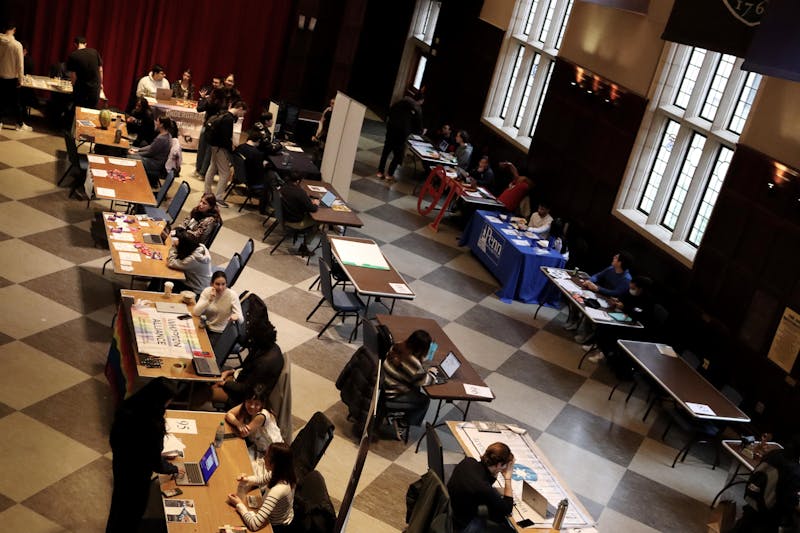
Riane Lumer | Consider non-preprofessional activities this club cycle
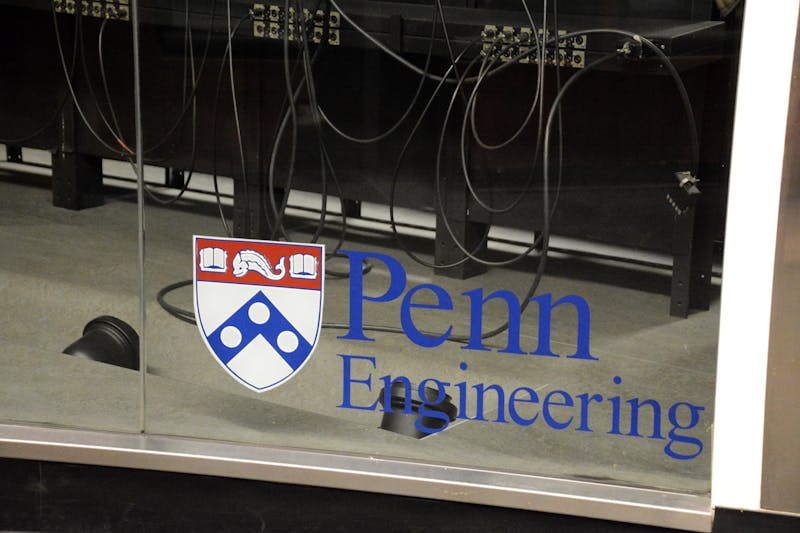
Akiva Berkowitz | An AI major by any other name

Francesco Salamone | Is Penn about liberal arts or elite jobs?
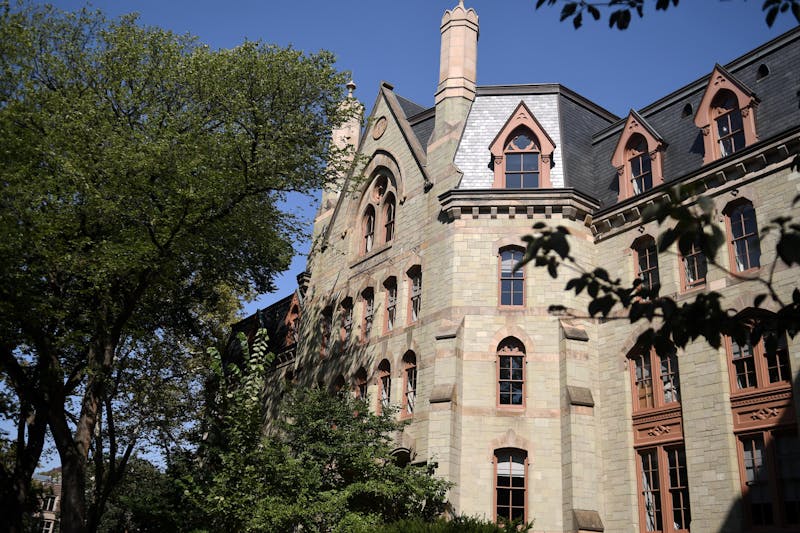
Jessey Shin | “Why is your pre-major advisor so much better than mine?”

Mariana Martinez | Status update: In a toxic relationship with academia
- Skip to main content
- Keyboard shortcuts for audio player
John Barth, innovative postmodernist novelist, dies at 93
The Associated Press
ANNAPOLIS, Md. — John Barth, the playfully erudite author whose darkly comic and complicated novels revolved around the art of literature and launched countless debates over the art of fiction, died Tuesday. He was 93.
Johns Hopkins University, where Barth was an emeritus professor of English and creative writing, confirmed his death in a statement.
Along with William Gass , Stanley Elkin and other peers, Barth was part of a wave of writers in the 1960s who challenged standards of language and plot. The author of 20 books including "Giles Goat-Boy" and "The Sot-Weed Factor," Barth was a college writing instructor who advocated for postmodernism to literature, saying old forms were used up and new approaches were needed.
Barth's passion for literary theory and his innovative but complicated novels made him a writer's writer. Barth said he felt like Scheherazade in "The Thousand and One Nights," desperately trying to survive by creating literature.
He created a best-seller in 1966 with "Giles Goat-Boy," which turned a college campus into a microcosm of a world threatened by the Cold War, and made a hero of a character who is part goat.
The following year, he wrote a postmodern manifesto, "The Literature of Exhaustion," which argued that the traditional novel suffered from a "used-upness of certain forms." The influential Atlantic Monthly essay described the postmodern writer as one who "confronts an intellectual dead end and employs it against itself to accomplish new human work."
He clarified in another essay 13 years later, "The Literature of Replenishment," that he didn't mean the novel was dead — just sorely in need of a new approach.

Book News & Features
The enduring life of lit mags: we'll always have (the) paris (review).
"I like to remind misreaders of my earlier essay that written literature is in fact about 4,500 years old (give or take a few centuries depending on one's definition of literature), but that we have no way of knowing whether 4,500 years constitutes senility, maturity, youth, or mere infancy," Barth wrote.
Barth frequently explored the relationship between storyteller and audience in parodies and satire. He said he was inspired by "The Thousand and One Nights," which he discovered while working in the classics library of Johns Hopkins University.
"It is a quixotic high-wire act to hope, at this late hour of the century, to write literary material and contend with declining readership and a publishing world where businesses are owned by other businesses," Barth told The Associated Press in 1991.
Barth pursued jazz at the Juilliard School of Music in New York, but found he didn't have a great talent for music, and so turned to creative writing, a craft he taught at Penn State University, SUNY Buffalo, Boston University and Johns Hopkins.
His first novel, "The Floating Opera," was nominated for a National Book Award. He was nominated again for a 1968 short story collection, "Lost in the Funhouse," and won in 1973 for "Chimera," three short novels focused on myth.
His breakthrough work was 1960's "The Sot-Weed Factor," a parody of historical fiction with a multitude of plot twists and ribald hijinks. The sprawling, picaresque story uses 18th-century literary conventions to chronicle the adventures of Ebenezer Cooke, who takes possession of a tobacco farm in Maryland.

Here's how to set your reading goals and read more books in 2024
Barth was born on Maryland's Eastern Shore and set many of his works there. Both his 1982 "Sabbatical: A Romance" and his 1987 "The Tidewater Tales" feature couples sailing on the Chesapeake Bay.
Barth also challenged literary conventions in his 1979 epistolary novel "Letters," in which characters from his first six novels wrote to each other, and he inserted himself as a character as well.
"My ideal postmodernist author neither merely repudiates nor merely imitates either his twentieth-century modernist parents or his nineteenth-century premodernist grandparents. He has the first half of our century under his belt, but not on his back."
Barth kept writing in the 21st century.
In 2008, he published "The Development," a collection of short stories about retirees in a gated community. "Final Fridays," published in 2012, was his third collection of non-fiction essays.
- Share full article
Advertisement
The Morning
Baruch college, an upward-mobility machine.
The New York school is praised as a model college in a new report on diversity in higher education.

By David Leonhardt
City College of New York often serves as a nostalgic symbol of American higher education’s past. The college did not charge tuition for decades, and its students, many of them poor, went on to become Nobel laureates, chief executives, civil rights leaders and more. By contrast, higher education today can seem both less accessible and less rigorous.
But it turns out that the school that occupies City College’s original 19th-century campus, on the East Side of Manhattan, has done a fine job of living up to its predecessor’s legacy.
That school is Baruch College, and it is an upward-mobility machine.
More than 60 percent of Baruch students receive Pell grants, which means they typically come from the bottom half of the income distribution. About 75 percent of undergraduates are people of color. The average annual cost of attending Baruch for low-income students is less than $2,000. And Baruch’s six-year graduation rate is 74 percent, well above the national average.
When I asked S. David Wu, an engineering scholar who is Baruch’s president, about City College’s original vision of educating the masses, he told me, “In many ways, Baruch is realizing that vision, but in a 21st-century way.”
In today’s newsletter, I’ll tell you about a new report that tracks how other colleges are doing.
A worrisome decline
After Michael Bloomberg finished being mayor of New York City in 2013, he turned his attention to philanthropy and decided that increasing economic diversity in higher education was a priority. “America needs to have as big a pool of talented, hard-working, well-educated people as it can possibly get,” Bloomberg told me.
His main program is known as the American Talent Initiative, and its goal is to persuade colleges with high graduation rates to diversify. This morning, the group released its latest report , and it praises Baruch as a model college.
“There are very few colleges in the country like Baruch,” said Josh Wyner of the Aspen Institute, which helps run the American Talent Initiative. Indeed, among all U.S. colleges with a graduation rate above 70 percent, Baruch may be the most economically diverse. It both holds down tuition costs and creates clear pathways for students to earn degrees, Wyner said.
Other parts of the new report, however, are worrisome.
Bloomberg’s group set a goal almost a decade ago: Lift the annual enrollment of low- and moderate-income students at colleges with high graduation rates by 50,000 — or roughly 10 percent. The group planned to do so partly by building a membership organization where colleges could share strategies.
Initially, the progress was impressive. Enrollment jumped by more than 20,000 in the initiative’s first three years, putting it comfortably on pace to achieve the goal within a decade.
But momentum stalled in 2019-20. The reasons weren’t completely clear, but I’ve noticed that economic diversity often declines when college administrators aren’t paying close attention. Other priorities — sports teams, fund-raising, U.S. News’s rankings — take over. Covid made the situation worse, by exacerbating K-12 inequality and preventing some lower-income students from making it to college.
By fall 2021, all the early progress had been erased. Enrollment of lower-income students at colleges with high graduation rates was slightly below its 2015 level.
In response, the initiative got tougher. To remain members, college now must commit to specific lower-income enrollment levels, rather than vaguely promising to make progress. A small number of colleges have since dropped out. Among them, according to public records, were Penn State and Virginia Tech, as well as several private schools, including Wake Forest, which is among the country’s least economically diverse colleges, and Denison, in Ohio.
( This Times feature lets you look up economic diversity at nearly 300 colleges.)
But 125 colleges remained, including the entire Ivy League and the flagship state universities in California, Michigan, Texas and Wisconsin. About 15 schools more have recently joined. Baruch is among them, as are Colorado College, Illinois State and Towson.
At these member schools, lower-income enrollment has fully recovered from its recent decline. Updated data isn’t available for the roughly 200 other colleges with a graduation rate of at least 70 percent, but their trend is unlikely to be so positive:
Successful strategies
The new report cities several promising strategies for lifting diversity, such as:
Reduce so-called merit aid , which tends to go to affluent students, and direct scholarships to students who demonstrate both academic excellence and financial need. Boston University has recently done so.
Recruit more transfers from community colleges , where top students from modest backgrounds often start . Central Florida, Dayton, George Mason and the University of California all emphasize community-college transfers, and Princeton recently started a program.
Help students navigate higher education . Its bureaucracy can be so maddening that it keeps students from graduating. In response, Baruch has created an office called BOSS — Baruch One Stop Shop — where students can get help enrolling in classes or filling out aid forms. The college has also created cohorts of first-year students who take classes together and can help one another.
Baruch’s mission, Wu told me, is to educate a student body that resembles society at large — and increase upward mobility as a result. “Our diversity,” he said, “very much reflects the diversity of New York.”
Some colleges will soon charge $100,000 a year. My colleague Ron Lieber explains how it happened.
President Biden will announce student debt relief for millions of borrowers in a Wisconsin speech.
THE LATEST NEWS
Israel-hamas war.
The Israeli military has reduced the number of troops in Gaza. Only a fraction of the soldiers that it deployed to the enclave earlier in the war remain.
Despite the drawdown of troops, the military has promised a future mission in Rafah , southern Gaza.
The war reached the six-month mark with the conflict at an impasse.
Nicaragua, a supporter of Palestine, is bringing a case against Germany at the International Court of Justice for supplying arms to Israel.
War in Ukraine
Some Ukrainians, unable or unwilling to leave home, remain in villages on the front lines. See photos .
Donald Trump has a secret, long-shot plan to end the war by pressuring Ukraine to give up some territory, The Washington Post reports.
“I am still learning how to forgive”: Rwandans marked 30 years since a genocide there killed around 800,000 people.
A British endurance athlete known as the Hardest Geezer ran the length of Africa in just under a year , The Guardian reports.
Trump has made many populist promises, but many corporate executives believe that his second-term agenda couldn’t really happen . They might be in denial.
Trump said at a fund-raiser that he wants immigrants in the U.S. from “nice” countries “like Denmark.”
An examination of Trump’s public statements revealed how he distorts his opponents’ record and exaggerates.
Many of today’s seniors have voted Democratic at every stage of their lives. Nate Cohn explains why .
A bipartisan group of former national security officials have asked lawmakers to impose limits on a president’s power to deploy troops on domestic soil .
Other Big Stories
The U.S. will experience its second total solar eclipse in seven years today. Read how to watch and see the cloud forecast where you are .
In coastal cities, commuters — spurred by new routes and faster boats — are using ferries to get around .
A Southwest Boeing 737-800 made an emergency landing after an engine cover fell off during takeoff.
Maryland passed two privacy bills that limit how tech platforms can harvest and use personal data of consumers and young people.
Economists sent similar résumés to job postings at about 100 of the largest U.S. companies — but changed the applicants’ names to suggest an ethnicity. Some companies discriminated against Black applicants much more than others.
America was once the country begging richer allies for help. It can pay it back by supporting Ukraine , Stacy Schiff writes.
If Gmail is making you miserable, stop using it , as Ezra Klein has.
Gail Collins and Bret Stephens discuss the election and tech regulation .
Here are columns by David French on the parallels between Gaza and Iraq and Maureen Dowd on Trump’s “blood bath” comments .
MORNING READS
Away games: Meet a group of New Yorkers who pooled money to buy a Danish minor league soccer team .
Health tech: Patients can pay to have artificial intelligence read their mammograms. Experts are both excited and concerned .
Metropolitan Diary: Best taxi ride in 50 years .
Lives Lived: Albert Heath was a virtuoso jazz drummer who collaborated with John Coltrane and Nina Simone. He died at 88 .
Women’s college basketball: South Carolina beat Iowa , 87-75, to win their second national title in three years. Iowa’s defeat comes days before Caitlin Clark is expected to be the No. 1 pick in the W.N.B.A. Draft.
A G.O.A.T.: Dawn Staley, South Carolina’s coach, thanked Clark for making women’s basketball more popular. “ She carried a heavy load ,” Staley said. Read about Clark’s collegiate career .
Men’s college basketball: John Calipari is nearing a deal to coach at Arkansas .
UConn: The Huskies face Zach Edey and Purdue with a chance to become the first repeat men’s college basketball national champions since Florida in 2006 and 2007.
ARTS AND IDEAS
“University Challenge”: The New Yorker Brandon Blackwell knew that if he wanted to have a career in competitive quizzing, he had to move to its epicenter: London.
Despite already having a degree, he applied to Imperial College London to get a visa. Then, he competed for the college on the Britain’s premier quiz show, “University Challenge.” Blackwell’s appearance on the show in 2020 turned him into a national figure and Imperial — which had not won the competition since 2001 — into a “University Challenge” powerhouse .
More on culture
The “3 Body Problem,” a Netflix show, has outraged people in China despite it being from the country. That highlights how censorship has shaped public opinion , Li Yuan writes.
For nearly two decades, a gang stole items from small U.S. museums , including Yogi Berra’s championship rings.
In the finale of “Curb Your Enthusiasm,” Larry David essentially restaged the contentious “Seinfeld” ending, The Washington Post reports.
THE MORNING RECOMMENDS …
Finish any blend of cheese in your fridge with this quick stovetop mac and cheese .
Trick your brain to love running with these three tips .
Buy a gift for under $25 .
Keep your dog warm and dry on rainy days with a raincoat .
Take our news quiz .
Here is today’s Spelling Bee . Yesterday’s pangrams were curtain and taciturn .
And here are today’s Mini Crossword , Wordle , Sudoku , Connections and Strands .
Thanks for spending part of your morning with The Times. See you tomorrow. — David
Sign up here to get this newsletter in your inbox . Reach our team at [email protected] .
David Leonhardt runs The Morning , The Times’s flagship daily newsletter. Since joining The Times in 1999, he has been an economics columnist, opinion columnist, head of the Washington bureau and founding editor of the Upshot section, among other roles. More about David Leonhardt
- Election 2024
- Entertainment
- Newsletters
- Photography
- Personal Finance
- AP Investigations
- AP Buyline Personal Finance
- Press Releases
- Israel-Hamas War
- Russia-Ukraine War
- Global elections
- Asia Pacific
- Latin America
- Middle East
- Election Results
- Delegate Tracker
- AP & Elections
- March Madness
- AP Top 25 Poll
- Movie reviews
- Book reviews
- Personal finance
- Financial Markets
- Business Highlights
- Financial wellness
- Artificial Intelligence
- Social Media
John Barth, innovative postmodernist novelist, dies at 93
- Copy Link copied
ANNAPOLIS, Md. (AP) — John Barth, the playfully erudite author whose darkly comic and complicated novels revolved around the art of literature and launched countless debates over the art of fiction, died Tuesday. He was 93.
Johns Hopkins University, where Barth was an emeritus professor of English and creative writing, confirmed his death in a statement.
Along with William Gass, Stanley Elkin and other peers, Barth was part of a wave of writers in the 1960s who challenged standards of language and plot. The author of 20 books including “Giles Goat-Boy” and “The Sot-Weed Factor,” Barth was a college writing instructor who advocated for postmodernism to literature, saying old forms were used up and new approaches were needed.
Barth’s passion for literary theory and his innovative but complicated novels made him a writer’s writer. Barth said he felt like Scheherazade in “The Thousand and One Nights,” desperately trying to survive by creating literature.
He created a best-seller in 1966 with “Giles Goat-Boy,” which turned a college campus into a microcosm of a world threatened by the Cold War, and made a hero of a character who is part goat.
The following year, he wrote a postmodern manifesto, “The Literature of Exhaustion,” which argued that the traditional novel suffered from a “used-upness of certain forms.” The influential Atlantic Monthly essay described the postmodern writer as one who “confronts an intellectual dead end and employs it against itself to accomplish new human work.”
He clarified in another essay 13 years later, “The Literature of Replenishment,” that he didn’t mean the novel was dead — just sorely in need of a new approach.
“I like to remind misreaders of my earlier essay that written literature is in fact about 4,500 years old (give or take a few centuries depending on one’s definition of literature), but that we have no way of knowing whether 4,500 years constitutes senility, maturity, youth, or mere infancy,” Barth wrote.
Barth frequently explored the relationship between storyteller and audience in parodies and satire. He said he was inspired by “The Thousand and One Nights,” which he discovered while working in the classics library of Johns Hopkins University.
“It is a quixotic high-wire act to hope, at this late hour of the century, to write literary material and contend with declining readership and a publishing world where businesses are owned by other businesses,” Barth told The Associated Press in 1991.
Barth pursued jazz at the Juilliard School of Music in New York, but found he didn’t have a great talent for music, and so turned to creative writing, a craft he taught at Penn State University, SUNY Buffalo, Boston University and Johns Hopkins.
His first novel, “The Floating Opera,” was nominated for a National Book Award. He was nominated again for a 1968 short story collection, “Lost in the Funhouse,” and won in 1973 for “Chimera,” three short novels focused on myth.
His breakthrough work was 1960’s “The Sot-Weed Factor,” a parody of historical fiction with a multitude of plot twists and ribald hijinks. The sprawling, picaresque story uses 18th-century literary conventions to chronicle the adventures of Ebenezer Cooke, who takes possession of a tobacco farm in Maryland.
Barth was born on Maryland’s Eastern Shore and set many of his works there. Both his 1982 “Sabbatical: A Romance” and his 1987 “The Tidewater Tales” feature couples sailing on the Chesapeake Bay.
Barth also challenged literary conventions in his 1979 epistolary novel “Letters,” in which characters from his first six novels wrote to each other, and he inserted himself as a character as well.
“My ideal postmodernist author neither merely repudiates nor merely imitates either his twentieth-century modernist parents or his nineteenth-century premodernist grandparents. He has the first half of our century under his belt, but not on his back.”
Barth kept writing in the 21st century.
In 2008, he published “The Development,” a collection of short stories about retirees in a gated community. “Final Fridays,” published in 2012, was his third collection of non-fiction essays.
This story was first published April 2, 2024. It was updated April 3, 2024, to correct the name of one of Barth’s peers. He is Stanley Elkin, not Stanley Elkins.
AP Entertainment Writer Andrew Dalton contributed from Los Angeles.
- About the Hub
- Announcements
- Faculty Experts Guide
- Subscribe to the newsletter
Explore by Topic
- Arts+Culture
- Politics+Society
- Science+Technology
- Student Life
- University News
- Voices+Opinion
- About Hub at Work
- Gazette Archive
- Benefits+Perks
- Health+Well-Being
- Current Issue
- About the Magazine
- Past Issues
- Support Johns Hopkins Magazine
- Subscribe to the Magazine
You are using an outdated browser. Please upgrade your browser to improve your experience.
John Barth, towering literary figure and revered mentor, dies at 93
Barth, a johns hopkins graduate who later taught at his alma mater for more than two decades, was known for his postmodernist, unpredictable fiction and his exacting, generous teaching.
By Rachel Wallach
John Barth, A&S '51, '52 (MA), groundbreaking and prolific author, revered teacher, and professor emeritus in The Writing Seminars at Johns Hopkins University, died Tuesday. He was 93.
Image caption: John Barth
Best known for his postmodernist, unpredictable fiction and his exacting and generous teaching, Barth served on the Johns Hopkins faculty from 1973 until he retired in 1995. He is the author of 17 novels and collections of short fiction and three collections of essays. He won a National Book Award, F. Scott Fitzgerald Award for Outstanding Achievement in American Fiction, a Lannan Foundation Lifetime Achievement Award, and the PEN/Malamud Award for Excellence in the Short Story.
"Not just a master of fiction and of the literary essay, John Barth was a rhetorician on the order of a Samuel Johnson," said Jean McGarry , A&S '83 (MA), Academy Professor and Barth's former student and then colleague in The Writing Seminars. "Well-read and deeply thoughtful, it was a pleasure to be in his company, whether as his student or colleague. Passionate about literature, and with peerless taste, he was full of wit and wisdom, and had an almost scientific gift for anatomizing the elements of fiction: bones, flesh, nerves, heart, and lungs. He was also funny, tall, and handsome, and never missed a trick. In a rare way, he epitomized his fiction in his own gallant and witty person."
Barth's upbringing on Maryland's Eastern Shore left a powerful echo in the coastal settings of many of his books as well as the understated, southern lilt to his voice. After almost embarking on a career as a jazz drummer, Barth stumbled into what was then Johns Hopkins' Writing, Speech, and Drama department. In a 1999 oral history with the Sheridan Libraries' Mame Warren that revealed a self-deprecating sense of humor, he credits his "a la carte" education (his job reshelving books from wheeled carts in the classics and Oriental Seminary stacks of the old Gilman library) with filling in much of the literary background he had not yet accrued.
After earning his master's degree at Hopkins, Barth served on the faculty of Penn State, SUNY Buffalo, and Boston University before returning to Hopkins as professor in what had then become The Writing Seminars with a joint appointment in the English department. He invited authors including Salman Rushdie, Grace Paley, John Updike, Raymond Carver, Joyce Carol Oates, and Italo Calvino to read from their work, and they did.
As a teacher, he was famous for never imposing his own style on his students, instead imparting to them a sense of both imagination and craftsmanship. His keen ear as a reader made him a deeply admired mentor; leading by example, he showed students how to dissect stories, listen for style and voice, and discern worthy storytelling—whether in their own writing or that of others.
"One of the delights of sitting in his classroom was hearing him X-ray a story, finding its hidden bone structure and energy source, and still be helpful in cutting away the fat," McGarry wrote for a festschrift for Barth in 2015.
John Barth, writer who pushed storytelling's limits, dies at 93
John barth, novelist who orchestrated literary fantasies, dies at 93.
Michael Martone, A&S '79 (MA), remembers driving to Cambridge, Maryland, for the viewing when Barth's father died. "What I remember is that he told us three stories about funerals he had attended with the usual perfect presentation of his storytelling. It was amazing," said Martone, professor emeritus in the University of Alabama's Department of English. "That even in the midst of that moment he was composing the narratives that would become part of his future narratives and mine. He was all about the story and the famous Freytag pyramid. Stories have beginnings, middles, and ends, and each part needed tending, revising, and amending. And each part is connected, entwined, and harmonic.
"He was my teacher but also my first and always 'outside' reader," Martone added, noting that Barth had pledged on the first day of class to read his former students' published work if they sent it to him. "I did for forty-plus years, everything I published in magazines and books. And he responded every time with a brief note of receipt and a message of thanks and 'keep going, don't stop.'"
Image caption: John Barth is seated at the head of the table in the old board room at Shriver Hall in this image from the 1970s.
Image credit : Courtesy of the Ferdinand Hamburger Archives, Johns Hopkins University
Barth's fiction has been described as striking a commanding balance between postmodern self-consciousness and wordplay, and displays the characterization and compelling plot more common in more traditional genres. In works described as playful and challenging, funny and deadly serious, his plots fragment and his points of view shift. He covered ground from the Chesapeake Bay to the Bronze Age city Mycenae to a generic housing development. His translated works found wide audiences in languages including Finnish, Greek, Hungarian, Italian, Japanese, and Polish, and continue to make significant appearances in public readings, recordings, adaptations, reviews, and critical essays.
Barth's writing veered from the existential to comical nihilism to metafiction; in 1987's "The Tidewater Tales," a minimalist novelist and maximalist oral historian tell each other stories while sailing around the Chesapeake. "Lost in the Funhouse" features a 13-year-old boy exploring Ocean City, Maryland, with his family and simultaneously commenting on his own story, leaving readers reeling between the plot and the commentary as if visiting a boardwalk funhouse. Other best-known works include "The Sot-Weed Factor," "The Floating Opera," "Giles Goat-Boy," and "Chimera," for which he received the National Book Award for fiction in 1973
In 1995, Barth retired from Hopkins and became a senior fellow at Washington College in Chestertown, Maryland. He received an honorary Doctor of Humane Letters degree from Hopkins in 2011, was a fellow of the American Academy of Arts and Sciences, and was elected to the American Academy of Arts and Letters.
The Johns Hopkins Sheridan Libraries hold collections of Barth's manuscripts and books from his personal library, acquired in 2014 . A 2015 exhibit introduced the collection to the public . Typescript drafts with Barth's handwritten corrections offer a glimpse into his writing process, while reviews and critical analyses reveal evolving attitudes toward postmodernism and meta-fiction. The Sheridan Libraries are also processing newly acquired materials, including a set of letters between Barth and his long-time friend and fellow writer Daniel Tamkus. Additional papers can be found at the Library of Congress .
Tagged literature , writing seminars , obituaries , john barth
Related Content

A remembrance of John Barth

Teacher, teacher

A Literary Revival
You might also like, news network.
- Johns Hopkins Magazine
- Get Email Updates
- Submit an Announcement
- Submit an Event
- Privacy Statement
- Accessibility
Discover JHU
- About the University
- Schools & Divisions
- Academic Programs
- Plan a Visit
- my.JohnsHopkins.edu
- © 2024 Johns Hopkins University . All rights reserved.
- University Communications
- 3910 Keswick Rd., Suite N2600, Baltimore, MD
- X Facebook LinkedIn YouTube Instagram

COMMENTS
Penn State has one, optional supplemental essay prompt for all applicants, which is essentially a personal statement. Applicants to Penn State's Schreyer Honors College, or Accelerated Pre-Med program, will also have to respond to a fairly extensive list of supplemental prompts—2 essays and 8 short answers for the Honors College, and 4 essays for the BS/MD program.
2023-24 Penn State Supplemental Essay - Prompt and Tips. September 6, 2023. With an acceptance rate still above 50%, it would be easy to misjudge how challenging the Penn State admissions landscape truly is. In fact, those entering the famed University Park campus sport mid-50 SATs of 1270-1450. They also boast an unweighted GPA range of 3.59 ...
How to write each supplemental essay prompt for Penn State. Prompt #1: Optional personal essay. Prompt #2: "Gap year" essay. Known for its legendary school spirit, top-tier athletic program, and student body the size of a small city, Pennsylvania State University is chock-full of personality and opportunity.
The Penn State essay, sometimes also called the Penn State supplemental essay, is a 500 word written response included in the Penn State application for admission. The prompt for this essay invites applicants to tell the admissions committee about themselves.
An engaging Penn State supplemental essay is key to a strong application. Our expert guide will help you maximize your admissions odds! ... Founded in 1855 as an agricultural college, Penn State University is now a top-ranking research university located in Centre County, Pennsylvania.
Pennsylvania State University, commonly known as Penn State, is a public land-grant research university located in State College, Pennsylvania.It is widely known for its high ranking athletics and undergraduate degree programs. We are here to help you respond to the Penn State supplemental essays, so keep reading!. The Penn State prompts
Penn State Supplemental Essays 2023-24. With test-optional colleges like Penn State on the rise, mastering the Penn State supplemental essay has never been more important. Beyond seeing a strong academic record, the admissions team wants to hear directly from you. That is why including a top tier Penn State essay is so valuable in the admissions process.
Dual Admissions Program. Penn State's Commonwealth Campuses have partnered with Pennsylvania Community Colleges to provide a seamless Dual Admissions Program for students seeking to complete a four-year degree at Penn State. Apply Now. Penn State accepts online applications through the MyPennState Application and the Common App.
Undergrad College: Yale University '21 Major: Ethics, Politics & Economics; Classics (Intensive) Work Experience: As a recent graduate of Yale University, I am excited to begin my first year with CollegeVine!In many ways, CV was a natural fit for me -- at Yale, I worked for over two years in the Office of Undergraduate Admissions, beginning as a Senior Interviewer in the summer of 2019, during ...
The Schreyer Honors College essay questions are posted in mid-July to give you plenty of time to craft well-written, comprehensive responses by our application deadlines. View Essay Questions ; Create a MyPennState Account. Create a MyPennState account, and explore the Penn State University undergraduate application website.
Old Main building at Penn State's University Park campus. Found in the heart of Pennsylvania, Pennsylvania State University (PSU) is a public, land-grant university with a multitude of locations and the primary campus being at University Park, Pennsylvania. ... For more guidance on personal essays and the college application process in ...
Author: Joe Schall, College of Earth and Minerals Sciences, The Pennsylvania State University. This courseware module is part of Penn State's College of Earth and Mineral Sciences' OER Initiative. Except where otherwise noted, content on this site is licensed under a Creative Commons Attribution-NonCommercial-ShareAlike 3.0 Unported License.. The College of Earth and Mineral Sciences is ...
Penn State GPA Requirements. The unweighted GPA requirements for Penn State are between 3.59 - 3.93 and 3.12 - 3.78 for University Park and Commonwealth Campus, respectively. Regardless of the campus you apply to, you will need a moderately high GPA and will likely be graduating at the top quarter of your class in order to get into Penn State.
Penn State University Application. Categories: College Education. Words: 472 | Page: 1 | 3 min read. Published: Mar 20, 2024. As a high school senior, I have spent countless hours researching and reflecting on potential colleges and universities to attend. Among the many institutions that I have considered, Penn State University has ...
2023-24 Short Answer & Essay Prompts. Penn Supplemental Short Answer Prompts (Required) Write a short thank-you note to someone you have not yet thanked and would like to acknowledge. (We encourage you to share this note with that person, if possible, and reflect on the experience!) (150-200 words, only required for first year applicants)
Additionally, high school students can opt for the Penn State Accelerated Program, a unique seven-year BS/MD program in collaboration with Penn State's undergraduate program. Best Medical Schools in Pennsylvania (Continued) 7) Drexel University College of Medicine. Location: Philadelphia; Acceptance Rate: 6.1%; Average GPA: 3.79; Average MCAT ...
Bellefonte poet and Penn State University professor of English Julia Kasdorf was honored with the Outstanding Contribution Award at the 2024 Writers Conference of Northern Appalachia. WCoNA ...
SANGITHA AIYER is a College sophomore studying cognitive science from Singapore. Her email is [email protected]. The Daily Pennsylvanian is an independent, student-run newspaper. Please consider making a donation to support the coverage that shapes the University. Your generosity ensures a future of strong journalism at Penn.
"I like to remind misreaders of my earlier essay that written literature is in fact about 4,500 years old (give or take a few centuries depending on one's definition of literature), but that we ...
The college has also created cohorts of first-year students who take classes together and can help one another. Baruch's mission, Wu told me, is to educate a student body that resembles society ...
He was 93. Johns Hopkins University, where Barth was an emeritus professor of English and creative writing, confirmed his death in a statement. Along with William Gass, Stanley Elkin and other peers, Barth was part of a wave of writers in the 1960s who challenged standards of language and plot. The author of 20 books including "Giles Goat-Boy ...
John Barth, A&S '51, '52 (MA), groundbreaking and prolific author, revered teacher, and professor emeritus in The Writing Seminars at Johns Hopkins University, died Tuesday. He was 93. John Barth. Best known for his postmodernist, unpredictable fiction and his exacting and generous teaching, Barth served on the Johns Hopkins faculty from 1973 ...